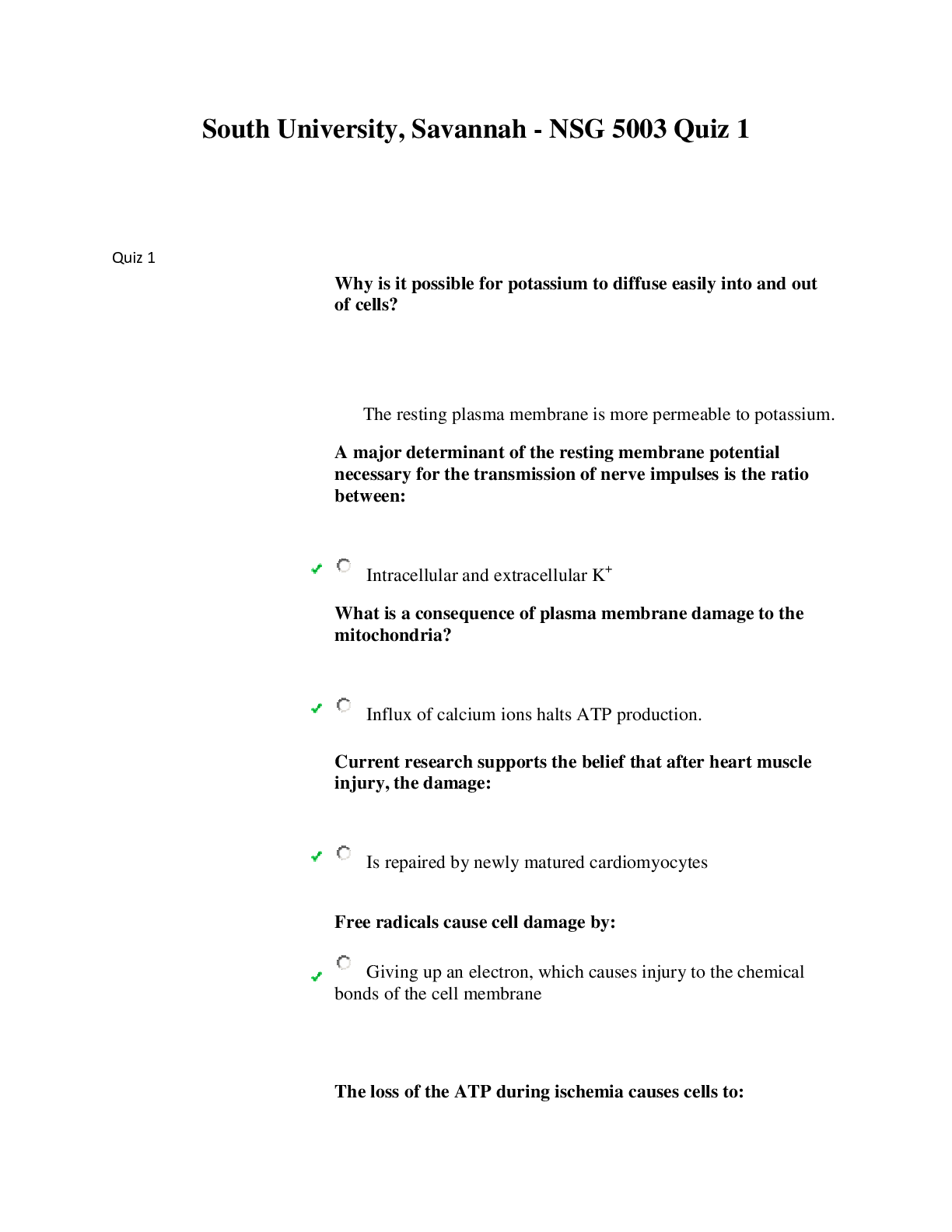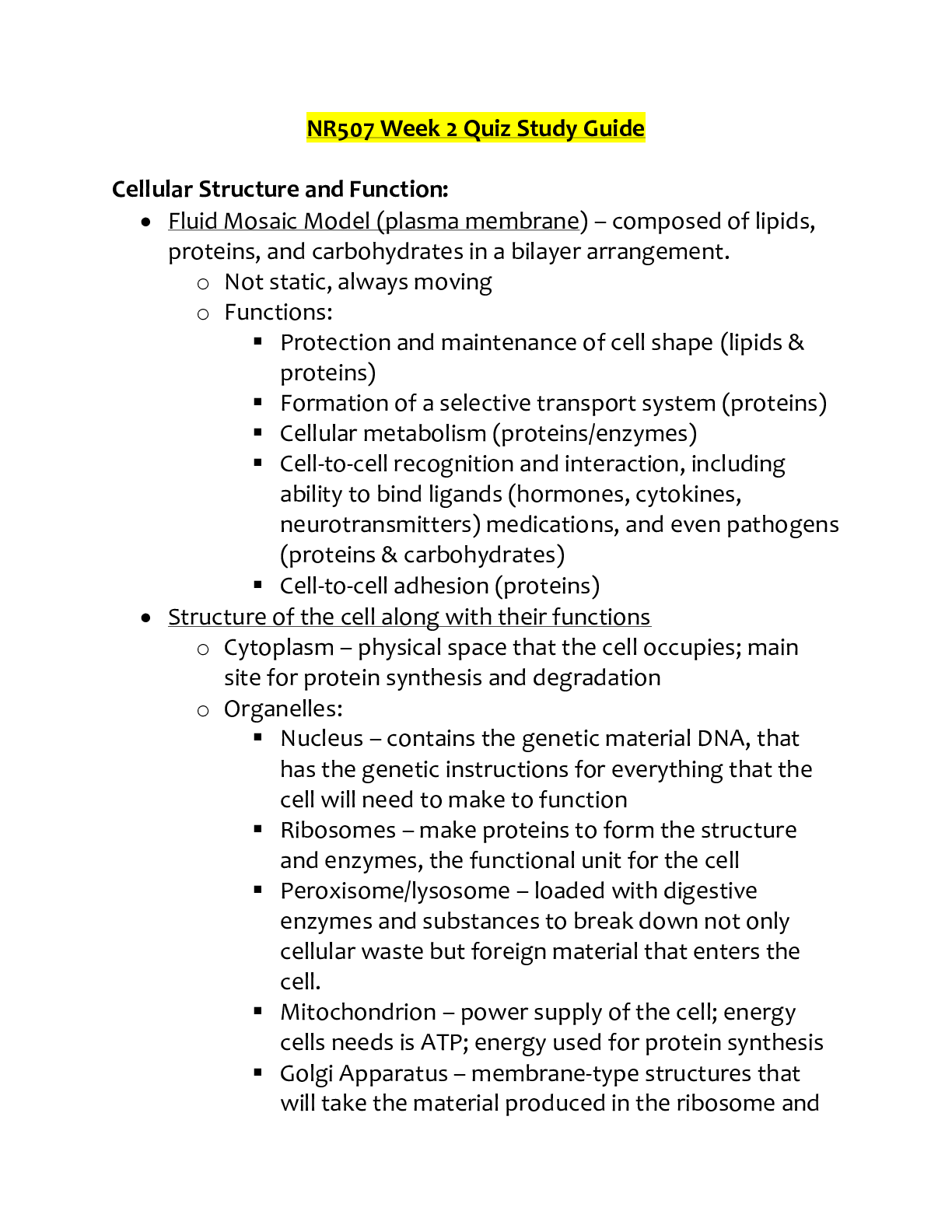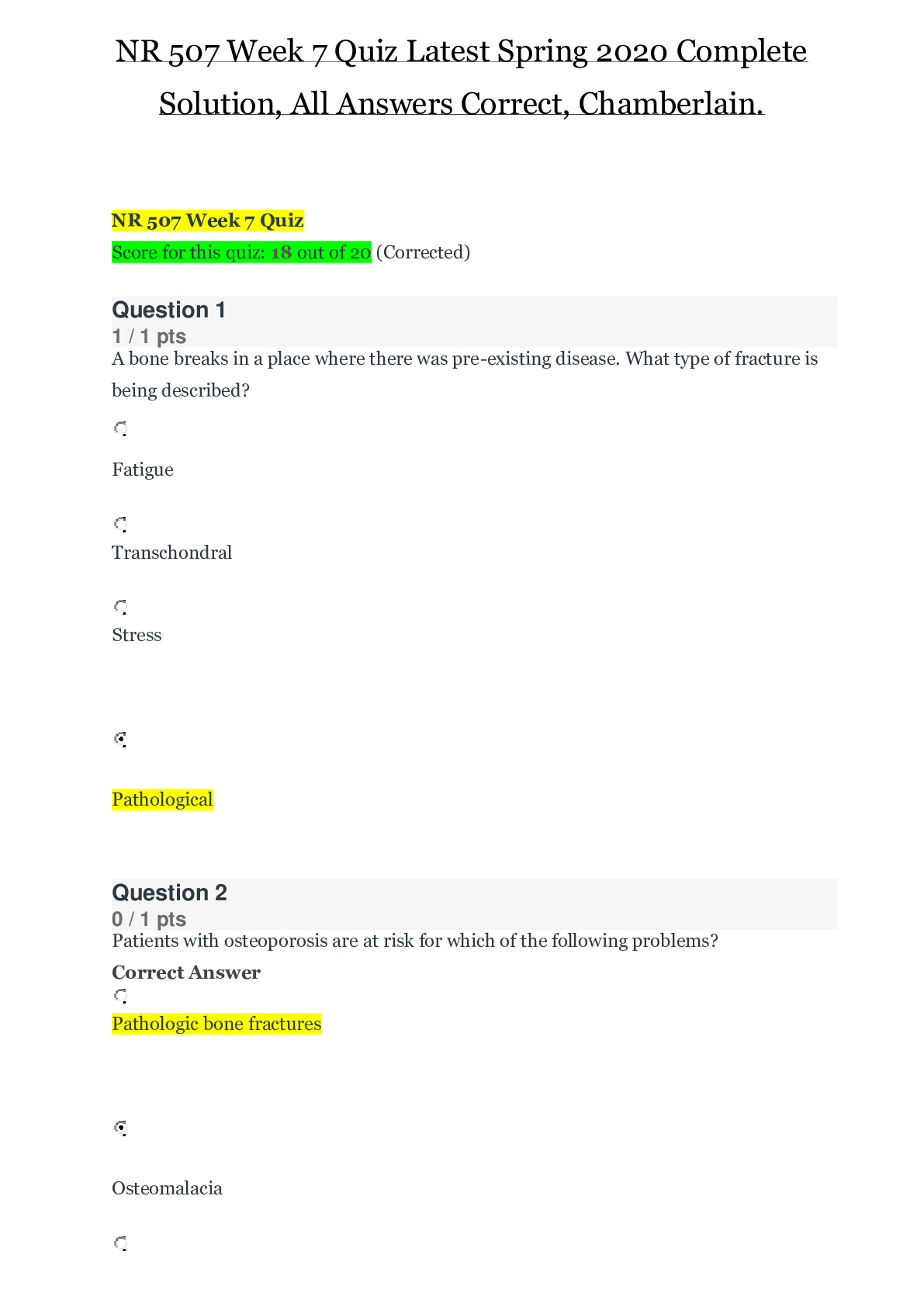Psychology > Quiz > PSYC 290N Week 1 Quiz – Based Homework - Graded An A (All)
PSYC 290N Week 1 Quiz – Based Homework - Graded An A
Document Content and Description Below
Questions: 8 months: 1. How does your baby's eating, sleeping & motor development compare to the typical developmental patterns? The Doctor stated that the baby is physically healthy. The Doctor re... commends a greater variety of baby food & some ground up veggies & fruits. Has a normal reaction to strangers & is able to adapt having a positive reaction to the situations & people at the Doctors office. His motor skills are typical for his age such as crawling, st&ing up, & sitting up. Overall, he is doing very well & is moving right along as he should at this age. 2. At 8 months of age was your child an "easy", "slow-to-warm-up", or "difficult" baby in terms of Thomas & Chess's classic temperamental categories? On what do you base this judgement? In terms of Thomas & chess’s classic temperamental categories Aiden Michael is a “slow-to- warm-up” baby. I noticed at the pediatrician he was hesitant at first to the Doctor & nurses, but warmed up. He began giving eye contact, smiled at them, & vocalized to them often. 3. How is your child's attachment to you & your partner developing? What is happening at the 3-month & 8-month periods that might affect attachment security according to Bowlby & Ainsworth, & various research studies? Aiden Michael has an obvious attachment to me, but still has fun playing with his dad. This is probably due to the fact I have been there for everything he needs (physically, emotionally, & mentally). I’m there to comfort him when he’s fussy, feed him, change his diaper & so on. We have slowly begun to have my partner become more of a main part of this aspect & also throw in some of our other family members like my mother. 19 months: 4. Describe & give examples of changes in your child's exploratory or problem solving behavior from 8 through 18 months & categorize them according to Piagetian & information processing theories. Note that 8 months is included, so you'll need to use the time-line to look back at 8 months for examples. Piaget’s stage for 4-8 months states the baby becomes more aware of events outside of their body, trial-&-error learning, & object concepts. (Boyd, 2015) from 8-12 months he states they are in the cross-model perception, intentional means-end behavior, if they want something, they do things to get it. Lastly, 12-18 months, babies begin experimenting or manipulating objects. Very active, purposeful trial-&-error exploration happens. (Boyd, 2015) I notice that Aiden Michael is average in these fields. I know this because at 9 months he was underst&ing a few words & pointed at things he wanted. At 12 months he understood a couple dozen words, pronounced his first clear word, & pointed to the object in question. (My parent’s dog) When Aiden turned 15 months he began “experimenting” & studying things in the environment. One example would be he pushes his bath toys under the water at different depths & watches them pop back up. At 19 months he is able to imitate actions & words that he has heard or seen. He is aware of basic categories (big & little, blue or red, & so on) I know this because he sorts his toys sometimes. 5. Analyze your baby's temperament in more detail at 18 months than you did at 8 months. How would you describe your baby in terms of the five aspects of temperament utilized by the Virtual Child program (activity, sociability, emotionality, aggressiveness vs. cooperativeness, & self control)? Has your baby's temperament been stable over the first 18 months? A blurb defining & providing examples of the five aspects of temperament is provided at 12 months, but you should seek out further explanations of temperament from your textbook. Explain how the concept of goodness of fit (also discussed in the blurb on infant temperament) applies to your interactions with your child. Aiden Michael’s temperament has been pretty constant throughout his first 18 months. He is a very easy baby, yet can be slow-to-warm-up when strangers are involved. His activity level is moderate, he has times of play & times of being passive. He is very sociable & gets along well with other kids. He is a little cautious when in new situations & new people but is able to adapt & warm up. He is very good emotionally so far, there is no statements that he is fussy a lot, they state he is very cooperative for his age at the preschool assessment test. He is very “goodness-of-fit” or able to adapt. (Boyd, 2015) He also showed very good self-control he was able to concentrate well during the testing & with staying on task. All this information was given to me by the specialist at the preschool we are trying to enroll him in. 6. Were you surprised by anything in the developmental assessment at 19 months? That is, does your perception of your child's physical, cognitive, language & social development differ from that of the developmental examiner? Give specific examples. If you were not surprised, write instead about some aspects of your child's development that need the most work. The examiner was overall impressed with Aiden. She stated to, “keep doing whatever you are doing”. She also recommended for us to ask Aiden questions that require an extended answer from just the usual yes or no, on top of looking & naming things in picture books. She also told us to give him more opportunities to play indoors/outdoors. Lastly, she recommended us to make more opportunities for Aiden to follow simple directions at home & gradually increase the complexity & length of the directions. Overall, I was very impressed with my baby’s development & the results from the assessment. 2 years 6 months: 7. Have there been any environmental events in your child's first 2 1/2 years that you think might have influenced his or her behavior? On what do you base your hypotheses? Other than being introduced to new people, events, & places nothing significant environmentally should have influenced my child in a certain way. He is about to begin a new preschool & I am pregnant again! (He doesn’t know I am pregnant yet) Other than that he is a very good baby & is developing within the normal expectations. 8. How is your child progressing on typical toddler issues, such as learning household rules, learning to follow routines, listening to you, developing self control & learning to get along with other children? He is very good right now. He was able to focus for 40 minutes during the examination session. The examiner did state I should ask Aiden to carry out more complex daily tasks. He is about average for solving problems & the examiner mentioned we should start “talking through” steps to solving problems more. We did have a hiccup with him not wanting to converse with a new play group leader, but we discussed with him what we expect of him & we used positive reinforcement for good behavior. He gets along with other children very well & is not aggressive. He would sometimes say, “Mine!”, however he would smile & give the toy up a few moments later. 9. Analyze your own parenting philosophy & practices. What principles from social learning theory, Bowlby, Ainsworth, Piaget, Vygotsky, information processing theory, developmental neuroscience & other theories do you appear to have relied on in making your parenting choices or interpreting your child's behavior? Include three principles/theorists from the above list in your answer. When I think about my parenting philosophy & practices, I never realized there would be a principle or theory to nae it with. I believe I am just doing what I was taught & what my mother did for me when I was little. I believe I follow more of a social learning theory I make sure that my child is able to see all there is & to learn from others around him. I encourage Aiden to solve things on his own, yet lend a helping h& when asked. Also, Ainsworth attachment theory came into place during my parenting style. Aiden is very attached to me & now my partner too. I know this because when he was unsure or uncomfortable, he would look to me for guidance & reassurance. I also see Aiden using Piaget’s stages in his theory as well. An example would be him in the bathtub with the toys, putting them under the water & watching them pop back up, experimenting & underst&ing more & more. 3 years 11 months: 10. What activities & experiences you & your child have engaged in might be promoting healthy behavioral practices & an interest in physical activity? I have exp&ed my sons playing by introducing him to more physical activity that have to do with balls like soccer, basketball, & catch. He also likes going for bike rides around the block. We started to participate in nature hikes, more play groups, & when he wants to quiet play, we have many options he can choose from. 11. Describe development of your child's language & cognitive skills & discuss how these might be affecting his or her interactions with you & your responses. He scored average for language skills & comprehension. He was able to tell stories with giving a broad outline & a few details. This allows him to be able to underst& some of the thing his teacher or I say to him. He is able to communicate affectively in situations as well. 12. How well is your child adapting to social situations in the home & outside the home? Does your child have any behavior or emotional problems at this point? Why do you think these problems are occurring & what are you doing about them? My child is very good at home but is lacking when following the rules outside of our home. Other than starting to lie about little things such as eating a cookie when he is not supposed to & running off at the store there are no problems at home. At school is another story, he only has a few friends but can be mean to them. He pushed another kid & doesn’t listen to the teacher or their rules. I am trying to be more affectionate towards him & communicate the rules clearly while do positive reinforcement tools. I honestly don’t underst& why these things are happening, maybe it’s his age? 4 years: 13. How would you characterize your parenting style? How have your specific parenting techniques changed since infancy? In what ways do you think your parenting style, or any other aspect of your parenting, has been influenced by your cultural background or other experiences? I believe my parenting style started with more nurturing & giving attention. I liked to get him involved with other people & things around him to stimulate development. As he aged & was able to underst& more, I started to communicate to him the rules & do positive reinforcement for good behavior. When he was acting bad I would give a verbal warning, then timeout, & lastly remove a privilege. This is the way my mother rose me. She also taught me to try & solve problems by myself, but she was there for me when I needed or asked for help. She says the best way to learn is by doing. 14. Describe two specific examples of changes in your child's behavior at age 4 that seem to stem from growth in cognitive & language ability since the period of infancy (e.g., improvements in symbolic thinking, reasoning, knowledge of the world, theory of mind). He has become a curious little boy. Asking questions about everything, wanting to learn more about animals & how things work. He likes doing puzzles & cognitive games, reading, singing, & so on. He is better at his though processes now & underst&s right from wrong. He is able to produce & comprehend when it comes to language. 15. How would you characterize your child's personality? Would you say that your child is primarily overcontrolled, undercontrolled or resilient? Support your argument. My child is normally really positive & good at making friends. He did have a little hiccup when making new friends & being mean or aggressive towards them. Now he seems to be better in that aspect. He seems to be between resilient, overcontrolled, & under controlled. I say this because sometimes he is good & doesn’t let things get in his way. Yet, sometimes he is timid or introverted, & can be aggressive towards kids sometimes. (pushing a kid) I think he has grown away from the aggressive towards others & more getting frustrated when doing activities & is a little more slow than some of the other kids. 6 years 11 months: 16. How well is your child adapting to social situations in the home & outside the home? Does your child have any behavior or emotional problems at this point? Why do you think these problems are occurring & what are you doing about them? I can see my child is doing very well or average in every aspect right now. Other than getting easily upset in stressful situations he is still able to calm down fairly quickly. He is doing well at home with us & his teachers state he is doing very well at school & with his friends. I am continuing what I am doing for a good outcome maybe a little bit more help in the stressful situation area. 17. Do you notice any improvements in cognitive & language skills since age 4? Give specific examples. Does your child have any special needs with regard to cognitive or language development at this point & what do you plan to do? He is excelling when it comes to reading, writing, speaking, listening, & knowledge of social studies & science. He is considered “developmentally appropriate” in spatial underst&ing, art, mathematical problems, underst&ing data, & number concepts. All is well at this point & we will continue with what we have been doing. 18. Which aspects of your child's behavior & personality reflect continuities from earlier behavior (e.g., at ages 3-4 years) & which seem to be novel for this age level? He seems to still get easily upset in stressful situations, but is now able to be calmed down quickly. He still enjoys reading & playing. He has worked hard on his listening skills & now obeys rules more. He seems to be doing above average or average in his schooling. 8 years 11 months: 19. How smart is your child, & in what areas? Think back to the blurb on multiple intelligences that appeared at age 6. Find specific evidence regarding your child's verbal, logical-mathematical, spatial, musical & bodily-kinesthetic intelligence from your observations of your own child as well as the psychologist's report at age 8 years, 11 months. My child has always been at least average. Recently in the new findings he was considered gifted in the verbal portion, slightly above average for math concepts, & average for visual-spatial ability. So overall, he is doing above what I would even imagine. I am very proud of how far he has come. He was average each year up until now, he is above average in almost all aspects. 20. Describe some examples of your child's behavior or thinking that you think are due to typical American gender role socialization & explain why you think so. Several examples can be found at ages 6 & 8. How closely does your attitude toward gender roles correspond to typical American attitudes, & if there is a discrepancy, to what do you attribute this (e.g., cultural background, attitudes of your own parents, etc.)? Previously when Aiden was six & eight, they stated that he was able to play with boys & girls but preferred boys. Playing with boys includes more physical activities like sports, while the girls are less physical & play with each other or dolls & talk. I have taught my kids about gender fluidity that boys & girls can do the same things if they want & that it’s ok to like some things that are more associated with girls than boys. I want my kids to appreciate everything & everyone there is. My mother taught me to be kind & love all. I was raised with three older brothers & an older sister & we all played together. Whether it be sports or dolls we all got along & had fun. 21. How might your child's development have been different if s/he was raised by people with a different socioeconomic, ethnic or cultural background? Base your answer on specific evidence of SES/cultural differences from the textbook & class lectures. I would consider my parenting type to be among the authoritative pattern which does correlate with my race per the book. This is the exact opposite style for Asian Americans. Parenting goals are influenced by cultural values. If I were to be honest if my child was raised by Asian Americans, they would be more reserved, restful, & more accelerated in the educational aspect this is due to their style of parenting (authoritarian style). (Boyd, Bee, 2015) 10 years 11 months 22. Describe your child's academic skills between ages 6 & 10 & assess how well these skills are developing. The 5th grade report card will be useful for this but you should also incorporate your own observations. What are you doing to help your child? My child started around the average for all things academically. He has become more advanced in all aspects besides spatial & art, where he is just average. I have seen him grow into a very well-rounded young man. My partner & I have been stimulating his interests & giving him every opportunity possible. We have provided him with educational help as well as games & activities that help stimulate his interest in learning. I am very proud in what he has accomplished in the past few years. 23. How well is your child adapting to social situations in the home & outside the home? Does your child have any behavior or emotional problems at this point? Why do you think these problems are occurring & what are you doing about them? I believe he is doing very well in the aspect of being social. I notice he is pretty popular with the other kids at school & has many friends. I allow him to have friends over & take them out every once & awhile. He has the occasional fights with his little sister. At the end of the day they have apologized & continue to play with each other. He is a great big brother & even helps us around the house as we are giving him more responsibilities. There are no problems I am aware of we will continue with the route we have started. 24. Has your parenting changed since the preschool period & if so, why do you think it has changed & what effect might this have on your child? Refer to your textbook or lecture notes for evidence on typical changes in parenting that occur in middle childhood. I believe as a parent you want the best for your child. We have shown his love & care throughout all years. As time goes on though I have been giving him more responsibilities such as doing chores around the house, letting him make decisions on his own, & making his own schedule at some point. (I am still here to remind & help occasionally) We push him to do his very best & give him opportunities to further his interests & education. He has been hanging with fiends more than us but that is normal for this time. We will always be here when he needs us or to be remindful. We do continue with the self-regulation model as well. (Boyd, Bee, 2015) 12 years 11 months: 25. Describe any physical or behavioral signs of incipient puberty. He seems to be relying more on his friends than me now. He doesn't like or accept much help from me, he likes to do it himself & be independent. He still is doing very well in school, he seems to be a leader in his friend group. There was a hiccup where he was being rowdy with his friends & some passing cars. At this age he begins to start the "needing a rush" or can be rebellious phase & also developing more of a moral underst&ing. 26. How would you characterize your child at this point in terms of the under- controlled, over-controlled or resilient categories? Have there been any changes since the preschool period & why might they have occurred? I believe he is very resilient, he knows what he wants, he is confident in himself & his friends, & is a good leader. He is more sure of himself now, & branches out more socially. This comes along with this phase in life, relying more on friends & peers & getting out there. 27. Using the 7th grade report card & your own observations, summarize your child's academic skills at this point. What specific activities might promote some of these skills? My child is doing fantastically academically! He is an all A student & is in honor courses. He has been told he is good enough for above his grade level courses & continues to do very well. I believe with us using positive reinforcement, incentives, & starting him academically very young it has helped him get where he is at now. 15 years: 28. What activities & experiences at ages 12 & 14 has your teen been involved in that might promote healthy behavioral practices, physical fitness & skill in sports? He has been involved in sports & clubs these past few years. He has taken a liking to baseball in particular & does very well in these after school organizations. He likes going out with friends & even went camping & learned the basics & how to use a compass. His Uncle moved back as well & has been showing Aiden how to play tennis with him. 29. Have there been any changes in your teen's behavior toward you or your partner? Why are these occurring & how are you responding? He seems to be going through the typical questioning & sometimes arguing with our rules, which is normal. Yet, he still remains respectful & compliant for the most part. I am trying to respond in an open way because I underst& what he is going through & how it was for me. Sometimes I give him more responsibility & space but he is constantly being reminded or told I'm here for anything. 30. Do you see any examples of how cognitive & physical changes in early adolescence (ages 12-14) relate to your teen's social or emotional behavior? He has become very focused on his appearances more recently. He has to have certain clothes, shoes, & hairstyles similar to his friends. I has made him work for these things such as doing chores to earn money for these things. I also believe he has come to enjoy the company of boys & girls as he invited more girls than previous years to his birthday. Lastly, him & a friend on the bus had a discussion about values & beliefs, they had differing opinions but he still was calm & listened to the other party. I then let him talk & see other views from other people so that he can choose his views & beliefs to what he believes to be right & wrong. 16 years 11 months: 31. Think about your teen's cognitive strengths & weaknesses & how they are reflected in his or her school grades & activities from 14-16 years of age. What careers or courses of study might be best suited to your teen's abilities & interests? I believe in Aiden, the sky is the limit. He is doing well in all aspects of school. He is an all A student in his courses & is in advanced classes. He tested very well on his PSAT, & continues to take advantage of the ACT prep courses. He is in after school organizations & clubs & also participates in sports. My child really likes reading, writing, & building things. He also enjoys being outdoors, so anything having to do with those he will succeed at. He also is very good in his Spanish courses so knowing Spanish might help excel his future endeavors more. 32. How important have your teen's relationships with peers been to his/her social development, emotional well-being & school achievement from 14-16 years of age? I believe being social in this phase of his life is very important. Having friends & being social helps growth & development. He learns what’s right & wrong, underst&s what good & bad friends are. Has learned about having a girlfriend & hopefully how to treat her correctly. He did have a hiccup choosing to go to a party, were illegal things happened. He still trusted me to drive him home from it & I restated my rules. Your peers influence your social being, what you wear, how you act, & so on. 33. How has your teen adjusted at 14-16 years of age to typical adolescent issues such as risk-taking, drugs, alcohol, & sexual interests, & how have you responded to your teen? He does have a girlfriend; my partner & I have communicated our rules & concerns to him about this. We taught him to be safe if he does choose to, but knows we do not agree with that. He also knows our rules about drinking & drugs. He came home one day smelling of weed & alcohol but stated he didn't want to ruin his career & sport potentials due to this. We believed him & sternly reminded him of our rules & the consequences that would therefore follow after. 18 years 1 month: 34. As the program ends, what pathways does your child appear to be on in terms of physical, cognitive, social, emotional & moral development? To what extent could you have predicted these pathways based on what you knew of your child's earlier development? Describe some specific ways in which you think your parenting mattered for your child's development, based on evidence from the course regarding the contributions of parents to child development. My child is on a very good path. He loves being active (baseball), he is doing very well in all classes at school (including honor AP courses), he is a popular kid with many friends, & treats his family, teachers, & friends with respect. Overall he has always been a good kid. He listens well & loves learning/writing. I believe my parenting skills mattered differently for different phases. Such as when he was an infant, he needed more stimulation & nurturing care. As he grew we started letting him make decisions, do chores, & so on. We were always there for him if he needed or wanted us to be. 35. Describe some specific ways in which your child developed that appeared to be influenced by factors outside your control, such as genes, r&om environmental events or the general influence of contemporary middle-class American culture. I believe that the reliability of my partner & I’s income helped us be able to provide all the opportunities that we did. If we didn’t have the means he wouldn’t be where he is today. We wouldn’t have the time to let him be with friends, give him tutoring, or giving an allowance for chores. Genes defiantly affect everything as well. People tend to say you get your smarts from your mom, & here this is exactly how my school age years was as well. 36. Bonus Question: Are there any issues you had with your parents, your school work, your friends, or your romantic involvements in the last year of high school that continued to be issues for you in college? Reflect on your own personality, interests & cognitive abilities at the time you graduated high school. How did these personality characteristics & abilities manifest themselves in subsequent years? How have they changed since your high school days, if at all? When I look back, I see how I did upset or disappoint my mom from time to time. I never fully rebelled against her or her rules while growing up. Every once & awhile I would say no or do something but nothing to the point I needed to be grounded & punished for a certain extent of time. I didn't choose the best friends in middle school & high school & I learned that the hard way. I was never boy crazy, but I was curious & interested. I was very school focused & wanted to be as "adult" or grown up as possible. I got a job & car when I could & did most of the chores around the house by myself. I really didn't have a choice in the matter though. My parents were split up & my mom had to work three jobs to make ends meet. I started out very dependent & artsy, I developed into a more mature, quiet kid, & lastly a hardworking, goal-focused, young- adult. My mother by no means is perfect, but none of us are, she did her best with what deck was h&ed to us. To me I believe she did a fantastic job. Emerging & Young adulthood: 37. This stage of adulthood presents many opportunities to make good choices & bad choices for yourself. What are some behaviors or choices you repeatedly make that you might need to improve? These may include habits, negative perceptions, unmanaged stress, or other health-related behaviors. How might these behaviors be obstacles to later-life success? I believe I have made smart decisions so far. I am enjoying college, I have been safe, & have been doing ok financially. I go to parties, yet I am the designated driver (I don't drink). I work hard in school & at work. I believe this will help me in my future endeavors in my life. 38. Make a list of "good behaviors" & "bad behaviors" you displayed in your REAL life before college. Do you believe these behaviors can later map onto "Good outcomes" & "bad outcomes"? How or why? I believe before starting college most of my behaviors were very beneficial for me. My good behaviors consist of having a job while in school, paying for most of my own things, working hard in school, doing extra-curricular activities, & not attending high school parties. My bad behaviors were skipping study hall, drinking alcohol (even though I was with family), & focusing too much on boys. I believe all of my behaviors taught me a lesson, good or bad. They all shaped me into I am today. 39. What are some good decisions you can make in your life now that you hope will continue to lead you to good outcomes down the road? Think about physical health, money management, decisions, emotional well-being, relationships & social behaviors, & even identity choices & personal values that would play a role in later stages of your development. I hope that me working & going to school full-time will continue to allow me to learn & mature. I hope it helps me with time-management skills & being able to h&le the stresses of being an adult. Being able to work & afford an apartment has been hard but it has been worth it. It has taught me how to h&le my money & time, & has allowed me to go through hard times with previous friends. It has taught me to st& up for myself & that sometimes disappointing people with my decisions will be more beneficial for me & my future. I am happy I have been able to workout & hope to keep up the good habits. I have learned a lot in college so far. Time- management, being smart with my money, underst&ing not every person or friend is meant to stay in my life, it’s ok to let go, & it’s ok to not be perfect. Don’t accept defeat but learn from it & keep pushing forward. 40. What parts of development do you predict might stay the same as you move into & through your adulthood years? What might influence this stability as you mature? I believe everything has the potential to change. Family demographics, finacials, education, jobs, family. Everything can change in the blink of an eye. I am hoping everything stays the same, but in life there are hurdles for us to jump through. Whether it be a sick family member, losing a job, or getting hit by a financial burden. I believe my emotions & wisdom will grow & mature more with development. The things I listed that could happen above will affect this development as well. 41. Think of some aspects of personality & development that might change as you grow older. Do you expect that nature/genetics or nurture/experience has more influence on your personality & development over time? How would you know whether nature or nurture is responsible for a change? I believe that my environment, those around me, & experiences will shape my personalilty & development. I believe nature & genetics play a role as well as experiences. I feel as though nurture was more needed when I was younger for development. Nature to me is unchanging, nurture you can change. Nurture is the act of affect towards others. 42. What are some reasons why individuals might choose to NOT raise children in their lifetime? These may include personal reasons &/or medical reasons. If you were deciding whether or not to have children, what sorts of variables within your control would you take into consideration? I feel people either hate kids or like kids. People who choose not to have kids probably do it because their job is more important to them & they would have no time for a kid. Maybe they don’t want to raise a kid in this day & age with everything going on. There could be many reasons why they would not want to have kids these are just a few. When deciding to have a kid I would think: can I financially afford one, do I have enough time to have one, do I have a good partner which will help support me & the little one, will family be willing to help out, & lastly will my job be underst&ing to let me have time off or be flexible. Middle Adulthood: 43. Imagine you sit down to dinner with your long-time friend & she tells you she is having jealousy issues in her marriage. Her husb&, whom you get along with, is upset that she has gotten to be too close with a male coworker, & he is interpreting their friendly banter as flirting. What advice might you give to your friend to help her alleviate the situation? I would try to sit down both parties. They need to discuss what they see & how they feel about the situation. They need to come to a compromise. Whether it be the husb& meeting this male coworker or the wife spending less time around the coworker. Something needs to be worked out between them & sometimes speaking things out loud with a mediator is what it needed for a resolution. 44. Do you see yourself as the kind of person who will stay in the same type of job for a long time, perhaps into retirement, or as more of a job hopper in order to climb the professional ladder? Explain why you see yourself this way & what factors would influence your decision. I see myself as somebody to stay within the same type of job for a long time. I see myself as a nurse that is always learning & changing specialties or areas of specialty, but ultimately, I would like to stay within the same facility. I work at OSU currently & plan on staying there as long as my professional career allows me to. The availability & ability to move is provided through my current job which is helpful, yet getting in trouble, fired, or budget cuts could influence the outcome. 45. What are some actions that you, or someone you know, could take to create a healthy, successful marriage? I believe when having an issue in a marriage being able to communicate effectively is key. If communication cannot be reached in a mature manner I believe bringing in a third party or counselor can help resolve issues or simply help you learn healthy habits to keep a good marriage. 46. Consider the timing of when people have children. For those who have children during Adolescence or Emerging Adulthood, how might their life outcomes differ from those who have children during Young Adulthood or even Middle Adulthood? If you could choose the age at which you have children, which age would you choose, & what sorts of variables within your control would you take into consideration? I feel having a kid really young could financially cripple you for future endeavors. It can put your dreams on hold or cause even more stress. I would want to start having kids once I graduate college & have a set job. I want to be financially set so I can give my kids everything they need & not have to worry about finances. I also want to be able to be set in a job that will allow me to be apart of my kids lives on top of providing for them. (around 24-30 years of age) 47. What kinds of stress responses do you tend to display in your real life? Make a list of some of your adaptive stress responses & consider how these serve as measures of resiliency. What are some maladaptive stress responses you've noticed about yourself or others? How might these responses contribute to even more stressful experiences? I have been dealing with a lot of stress & anxiety recently. Juggling school, working enough to pay my rent & bills, my dad’s cancer is back, my mom is going into bankruptcy, the list goes on. I try to work out & eat healthy but the lack of funds or time with my hectic lifestyle make it hard. The adaptive stress responses I use are probably the emotional discomfort & mechanism of defense. This is all due to stress & trying to protect myself from everything going on around me. The maladaptive responses that I see that can apply to me is the anxiety & sometimes this can lead to headaches, body pains, or feeling of nausea. This just puts little speed bumps in my days but I don’t let it hold me back from doing what needs to be done. Yet, my mind is always moving a million miles per second I’m always worrying about something. 48. Based on class discussions, describe what circumstances you think leads an individual to a midlife crisis. What type of theory best explains this experience? I believe Erikson’s theory explains the midlife crisis stage pretty well. This is where adults are at the generativity versus stagnation stage. Trying to search for meaning or purpose within their lives. I believe people in their middle aged years feel as though they are going through their mid life crisis due to a series of events. Loss of interest, loss of a job, added stress, financial issues, kids are growing up too fast, & so on. They look back of their lives & feel as though they have not accomplished much. This is where regret sets in & people start buying their br&-new cars. (That was a joke.) 49. Overall, divorce rates have declined in the last 20 years, but among middle-aged couples, the rates are rising. Do an internet search to find what current statistics are available for different groups of individuals, then describe three factors that contribute to contemporary rises in middle-aged divorce rates. Vital Statistics Report & the 2009 American Community Survey. In 1990, the paper noted, “approximately 206,007 people over age 50 got divorced, whereas in 2009 about 604,643 got divorced.”(Marriage Today, n.d.) Factors that contribute to this rise is people change over time, some don't like this. I've also heard finances affect this, not having the kids around is weird & people feel empty. They have more time together rather than worrying about kids & they get to know each other better now. Sometimes the flame isn't there anymore, people change, lose interest, & so on. Resource: Marriage Today By For Your Marriage Staff & Associates. (n.d.). Divorce Rate Rises for Middle- Aged, Older Americans. Retrieved from http://www.foryourmarriage.org/blogs/divorce-rate- rises-for-middle-aged-older-americans/ 50. Describe advantages & disadvantages of experiencing divorce in midlife. You might consider factors such as income, identity, mutual friends, investments, children & other family members, & the fact that dividing households later in a marriage will require divvying up items bought as a couple. How might divorce during young adulthood or late adulthood be different in terms of such factors? How might separation be different for long-term relationships where partners have been together but not married? The only advantage would be independence from an unhealthy situation. The disadvantages would be more of a hardship on your children, finances could be messed up, your self-worth, love will be messed up. Your children will have to split there time with you & the partner, finances would have to be split, belongings be split. In late adulthood divorce would be harder than if it were to happen in young adult hood. As a young adult you still have a lot of time to live & move on, in later adulthood you've already spent so much time & effort on that person it would be hard to move on. I feel being with someone as long as a married couple is still the same & hard when separating, might be easier legally though. (less paperwork) 51. Based upon the theory & research about mid-life crises discussed in your textbook & class, how might you explain a 40-something-year-old family member's sudden change towards unpredictable behaviors & emotionality? I would believe that they are reflecting on the past & are filled with regret. Regret of not accomplishing or doing things they wish they would have done sooner. Or maybe they are bored with going through the motion’s day in & out. They want change or to be able to say they accomplished what they set out to do. 52. How might some unique aspects of your cohort or generation have shaped your views of gender, sexual orientation, political viewpoints, or other categories of individual differences? I believe my generation is more open to different people & different ways of living compared to my gr&parents. We are open to openly straight, gay, transgender people, while other generations are not. We are freer to be open within our generation. 53. Long-term health effects are something to consider at nearly every age. What are some behaviors or choices a person could make during midlife that could be obstacles to later-life success? These may include habits, negative perceptions, unmanaged stress, or other health-related behaviors. During midlife people are busy with their kids & careers. Sometimes so busy that they have no time for self-care, eating right, or exercise. This will come to bite them in the butt when they are older with health issues due to the way they lived when they were younger. My mother always taught me yes I am younger now but the more I care for myself now the more I will thank myself later. Also I believe not doing things you want now will give negative perceptions or regret later on in life. 54. How does your tolerance of people who are different from you compare to that of people in your parents' generation? Is there a difference at all in your own family? Qualify your answer with examples & discuss why you believe differences, if any, exist. As I stated earlier my generation is more open to different people & opinions. We may everyone & awhile have our preferences to people due to how we were raised, but at the end of the day we should be more accepting of others. An example would be back then my parents grew up in a farming predominantly white community. I was raised by them with that mind set but I was also exposed to many different cultures & races at my school. I am more open to being friends with people different from me than my parents would be. 55. How well do you think you would cope with balancing the needs of two generations of family members in the same home if both generations were living in YOUR home? As you manage & focus on your own relationship needs, as well as work responsibilities, bills, life goals & plans how do you think you'd cope with having others living in your home who may have their own (different) needs or plans? Explain why you would or would not cope well. I feel it would be strained & stressful. Having multiple people with different values & views can be a really tense situation. I feel my parents would expect more of me but yet again I expect a lot of myself to show & raise to my kids. I would constantly feel as though someone were breathing down my neck. I believe I would be so focused on these issues I wouldn’t be able to focus very well on myself or my partner. 56. Describe how your job(s) can shape your perceptions & assessments of your overall life satisfaction. Would the age at which you conduct a life review have any influence on how you rate your overall satisfaction? Why or why not? If you don't love & enjoy what you are doing at your job your less likely to have a good perception of things & less likely to be satisfied with your life. Age I feel could have an effect on the reflection period. That would be an example of midlife crisis, looking back with regret. 57. How do you think your work history will play into your transition into & through retirement, as you forecast into the later adulthood years? Consider financial factors, such as social security, retirement-savings planning, & whether to stay employed part-time, in your response. Your job & it's benefits can dictate how good your retirement plan is. Every employer may have things set up differently. Preparing for retirement at a younger age helps you in the long run later. I know some people that love their jobs so much they don't want to retire or remain part-time. 58. What do you think might lead some people to experience a full-on midlife crisis, while others experience a mild crisis or simply a strong need to change just one thing to accomplish a work or life goal? I believe it can be a state of mind or thinking. Having bad things happen all at once or looking back with regret will cause a full out "midlife crisis". In all reality this can happen to anyone at any time just depends on the cards that you have been dealt. 59. Current national trends indicate that more middle-aged adults are caring for others than ever before. "Others" often include boomerang children, or children who move back in to their parents' home. What are some likely reasons for increases in parents having boomerang children? Going to college financially drains their kids. It's hard to get on your feet after school due to this financial burden. Housing is expensive, maybe their kids want to save up to move out of state, need to save up for a new car & staying at the parents house helps them out. Losing jobs can also lead to this. 60. Imagine that several of your peers changed companies at the same time that you were considering a change into a new career. They cited a number of reasons for making career changes in midlife, including the following: there was little challenge at their current job; the challenges became routine; their jobs changed in ways they do not like; they lost their current jobs, so they are switching careers all together; they were asked to do more with fewer resources; technological advances rendered their jobs no longer enjoyable; they were unhappy with their status & wanted a fresh start; they feel burned out; this is the last time they can make a meaningful change towards more job satisfaction before running out of time. Which of these reasons would compel YOU to change jobs in midlife? Describe your thoughts for each answer you select. I believe all of these reasons are completely underst&able. I feel burn out is very frequent within the medical field which is why they urge us to continue education, move around, & find something that makes you happy. Nursing is ever changing & there are so many routes you can go. Losing a job kind of forces you to get a new job, you need to enjoy what you do or it is a boring routine day in & day out. Sometimes people enjoy challenges or always changing scenery. 61. How do you see your midlife years leading you to successful (or unsuccessful) aging in the near future? I hope it is leading me to a successful aging in the near future. I hope to accomplish what I want & live with no regrets. Being grateful for where you are & how far you have come can play a big factor as well. Wake each day with a grateful heart, I hope to live by that saying. Late Adulthood: 62. Regardless of whether you are a parent or step-parent in your virtual life that you are leading, why do you think many parents report difficulties in maintaining or increasing intimacy with their adult children? In your answer, consider that for some parents their children often provide a perceived source of validation of their own beliefs, values, & st&ards. What are some reasons why or how children might resist their parents' desires to maintain a close intimacy with them? I feel when your kids become adults & are independent you want them to have that freedom. Or you don’t want to burden them by being around in their new-found freedom. You want your kids to make decisions for themselves & sometimes stepping aside is what you do. Life gets busy & continues on. Kids are so busy sometimes they forget about paying attention & visiting their parents. While the kids are busy the parents have a new routine & life as well. People move away & become their own person without parental help. Some kids might feel that they don’t need or value their parents values & thoughts. They want to do everything themselves & by themselves. 63. Sometimes older adults hesitate to give their adult children or other family members unsolicited advice or feedback because it might cause tension in the relationship if that feedback is negative. How do you feel about giving younger adults your advice or opinions, particularly if it might cause tension? Are there times when it is appropriate or inappropriate to give someone unsolicited advice? Draw on your own experiences or even your virtual person to provide examples. I believe giving advice should only happen when asked or brought up in a conversation. I really dislike it when people butt into my conversations & try telling me how to do things. I do appreciate it when I am talking to them & ask their opinions for them to give advice & feedback. I underst& they know more & have experienced more than me, that is why I would come to them in the first place. Also, if you believe the younger person is going to make a grave mistake & they didn’t ask your opinion I would state, “I’m sorry to butt in but…” & so on. One time I was talking with some friends about summer plans, an older person butt in & started giving their advice. While it was nice of them tp give advice, I did not ask their opinion nor did I really want it at the time. 64. Based upon the theory & research about mid-life crises discussed in your textbook & class, how might you explain a 40-something-year-old family member's sudden change towards unpredictable behaviors & emotionality? Within this phase of life, there are many different changes. Role changes, friendship changes, job changes, physical changes & so on. A lot of different things are happening or changing all at once. This can be overwhelming & sometimes affect your emotions & behaviors. With this phase comes making different decisions, regret, reflecting on the past, & so on. 65. How can involvement in civic or religious activity buffer you against stress effects? Give some examples from your personal life. Being a part of civic or religious activity is an alternative source of purpose & happiness to help others. This can reduce stress & overall bring a sense of being needed. I would say being apart of a food kitchen or missions trip gave me & overall feeling of happiness. Like I could accomplish something that mattered & helped people. 66. What are some reasons why you or your friends might continue to work past the age of retirement? I believe work gives you a sense of belonging. It gives you something to pass the time, you can earn money, & make friends all at one place. Mostly people would do this for finances. If finances are ok or good, I believe it is there for the social aspect or to be able to do something throughout your days of retirement. 67. Imagine you are 65 years old & you are experiencing conflicts with your adult children over a number of things: communication & style of interaction; lifestyle choices & habits; parenting practices; values, religion, ideology, & politics; work habits; & st&ards of household maintenance. How might you approach these conflicts or communicate with your children about them? Which differences could you feel at ease with & which would really bother you? I believe that your children are able to have their own beliefs & values as long as they respect yours & you respect them. I will make it know my rules within my house & they should know them. I will not fight with them what they should & should not believe in that is their choice. All I can do is hope I raised them in such a way to be respectful & go down the right path. The only belief that would really bug me is if they are very mean towards diversity, life, & being hateful. I can't st& full blown fanatics about things. 68. What employment problems might an older person face that could be the result of their age? Some of the issues could be being slower. Not being physically capable or even the tasks can become harder than what they used to be. Also, if your health is declining what job would want you as a liability. 69. What are some internal & external factors that might contribute to a positive outlook about aging? Having a positive outlook on life can make a big difference. When aging, continuing to have a healthy lifestyle, social life, mental health, & positive outlook will contribute to a positive outlook on the aging process. Some other factors that can contribute is who you surround yourself with. Your view points & their view points on aging. 70. According to Nancy Schlossberg, there are multiple paths of retirement that adults may follow. (a) Continuers; (b) Involved spectators; (c) Adventurers; (d) Searchers; (e) Easy gliders; (f) Retreaters. Which of these paths seem most probable for you? Why? As of right now I believe I would be somewhere along the lines of a continuer & adventurer. I want to go out & travel & see the world & experience new things. Yet, I feel being without a job after working my whole life I would feel empty. I would need some time of job or things to keep me busy & helping others. Maybe take up being a volunteer somewhere. 71. How much & in what ways are older persons like yourself influenced by gender identity beliefs? Do you think that gender issues are of concern for older adults? I hope by the time I am old that gender identity won't have to be a problem. I hope that people can be & say who they want to be without backlash. I feel as a older adult most are visualized as a straight couple whom have been married for many years. I want that to change I want it to be open, they can make choice they want, they can be with who they want. 72. What factors might lead a person to select gender atypical activities & life roles? Factors that can contribute to this would be influences. Who do you look up, who do you go to for advice, & whose opinion do you care about. Also, being taught in such a way & being open will help with fluidity. 73. Some of the best predictors of successful aging are an individual's general outlook on life & his or her ability to adapt to life's events-expected & unexpected! Looking back over your virtual life, which experiences could contribute to successful aging, & which could have put you at risk for unsuccessful aging? When I looked back on the virtual life, I would say the choices I made should positively impact my person. I kept her intrigued, wanting to continue to learn, & staying positive about aging in general. I had her & her partner enjoy life, her enjoying being apart of things, staying connected socially, & so on. 74. What are the benefits of connecting with others throughout life & particularly during Late Adulthood? If you could do your virtual life over, would you do anything differently? Storytelling & talking things out with people you care about can make a world of difference in your life. Staying connected & active socially will also decrease the likely hood of depression or having a negative outlook on aging. I wouldn't change a thing my person had a good life, has a beautiful family, & good friends. 75. What model would you use to describe your coping with death & dying? Use your textbook to identify the model & describe how the stages you confront might be played out in your late adulthood years. Comment on previous experiences in your life (in childhood, adolescence, or emerging adulthood ages) which might also contribute to such a response. I would be more closely related to the Kubler-Ross model. I would be sad & in the acceptance & denial phase. Like when my gr&mother passed away it didn't feel real. She's always been there & then she was gone just like that. 76. Do you expect to have a sense of ego integrity or ego despair as you move into & through late adulthood? What might make you more or less likely to have a sense of integrity? What decisions might you have made either now or in your virtual past to cope differently with either negative or positive experiences you have had in your virtual life? I believe I will have ego integrity moving through late adulthood. The more good things happen the easier this will be. With the hard times may come times of despair. Always having a good support system will help with everything that gets thrown at you. 77. Why are siblings such an important factor in elderly individuals having successful coping skills? Does this mean that aging persons without siblings (either due to loss or perhaps because they were an only child) are more at risk for problems in coping with aging? How might only children compensate for lacking siblings & have positive outcomes in later adulthood? I feel having someone there that knows everything about you & have gone through the same things as you throughout your whole life is helpful. Its very nice to have someone to experience the loss of a parent together, to reflect back on your lives, retell stories of your childhood. Not having someone like that there makes it tough for you alone. People without these individuals may rely more on the spouses, friends, & maybe children. 78. As a projective assignment, write your own obituary about your virtual life. What significant others in your life remain after you? What would you list as your meaningful moments or accomplishments, either those addressed within this virtual life course, or drawn from experiences not mentioned previously? You can write this from an observer's point of view (third-person), or from your own perspective (first- person) as an autobiographical letter. Your instructor will provide you with more details about this assignment. Marissa, 90, died 25th of February 2019 at her home in London due to natural causes. Her funeral will be help at the church on Friday. She was born in Columbus on December 13th to Debbie & Scott. She gained her master in Physical Therapy & had a successful career. She later married & had kids. She enjoyed nature walks, helping others, & being with her family. [Show More]
Last updated: 11 months ago
Preview 1 out of 27 pages
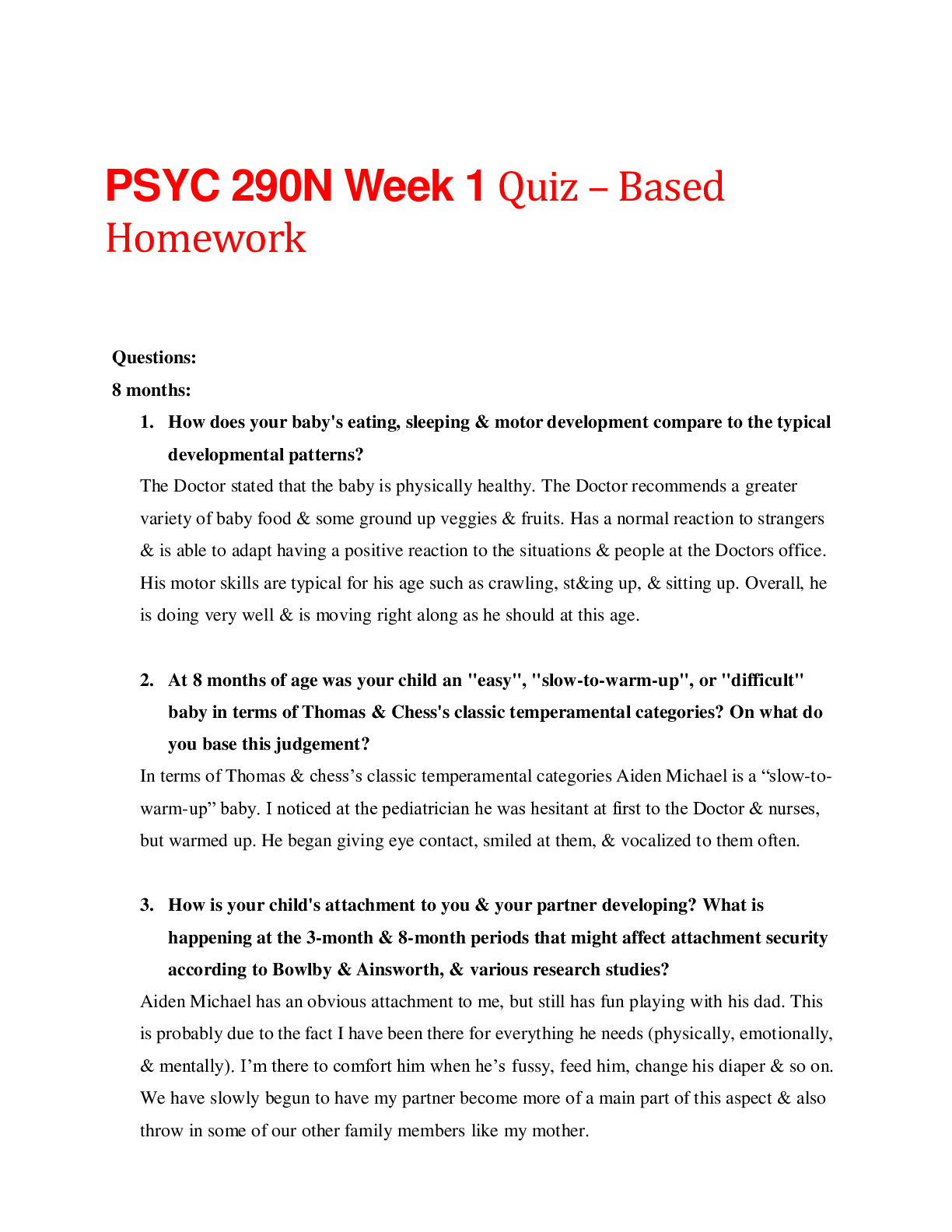
Reviews( 0 )
Document information
Connected school, study & course
About the document
Uploaded On
Jun 08, 2023
Number of pages
27
Written in
Additional information
This document has been written for:
Uploaded
Jun 08, 2023
Downloads
0
Views
55


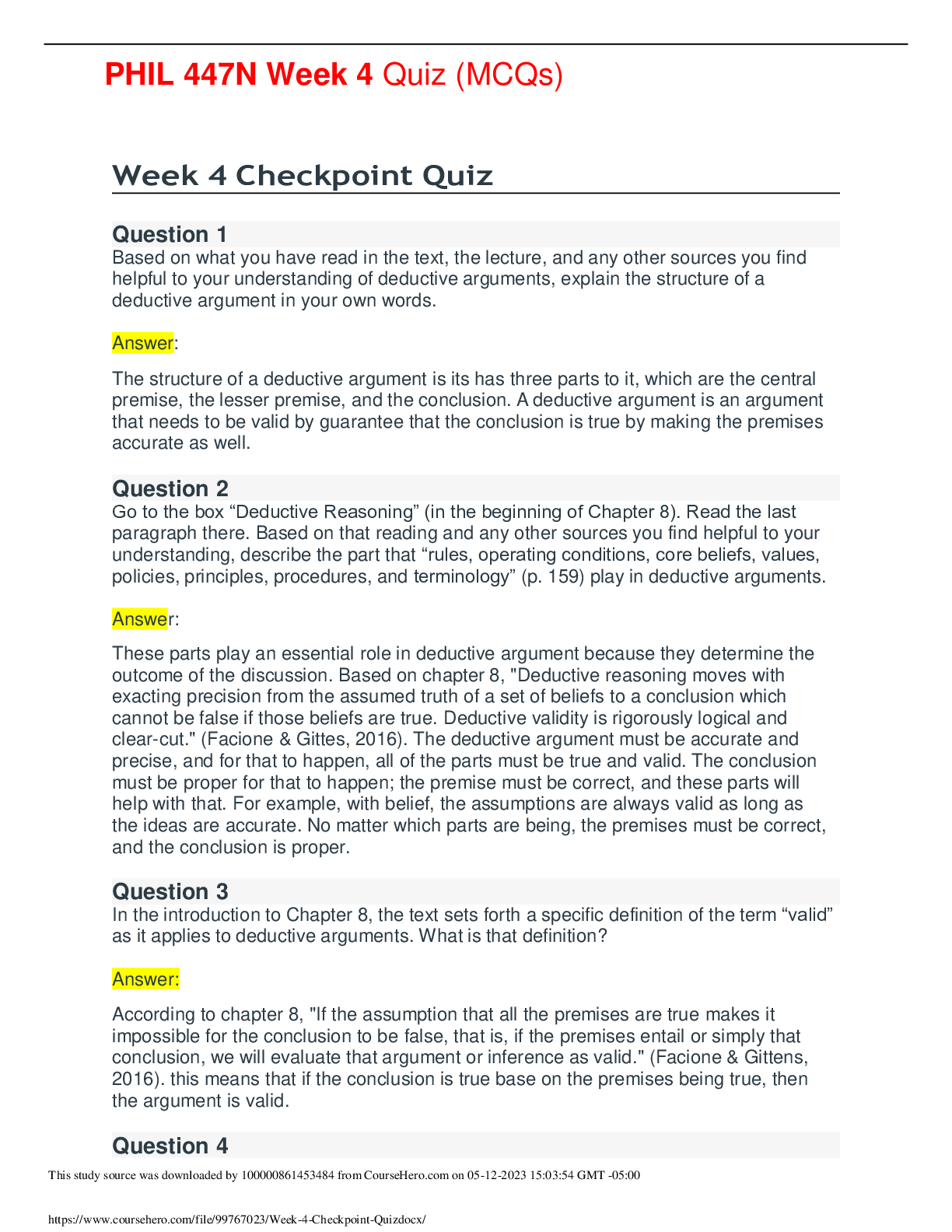
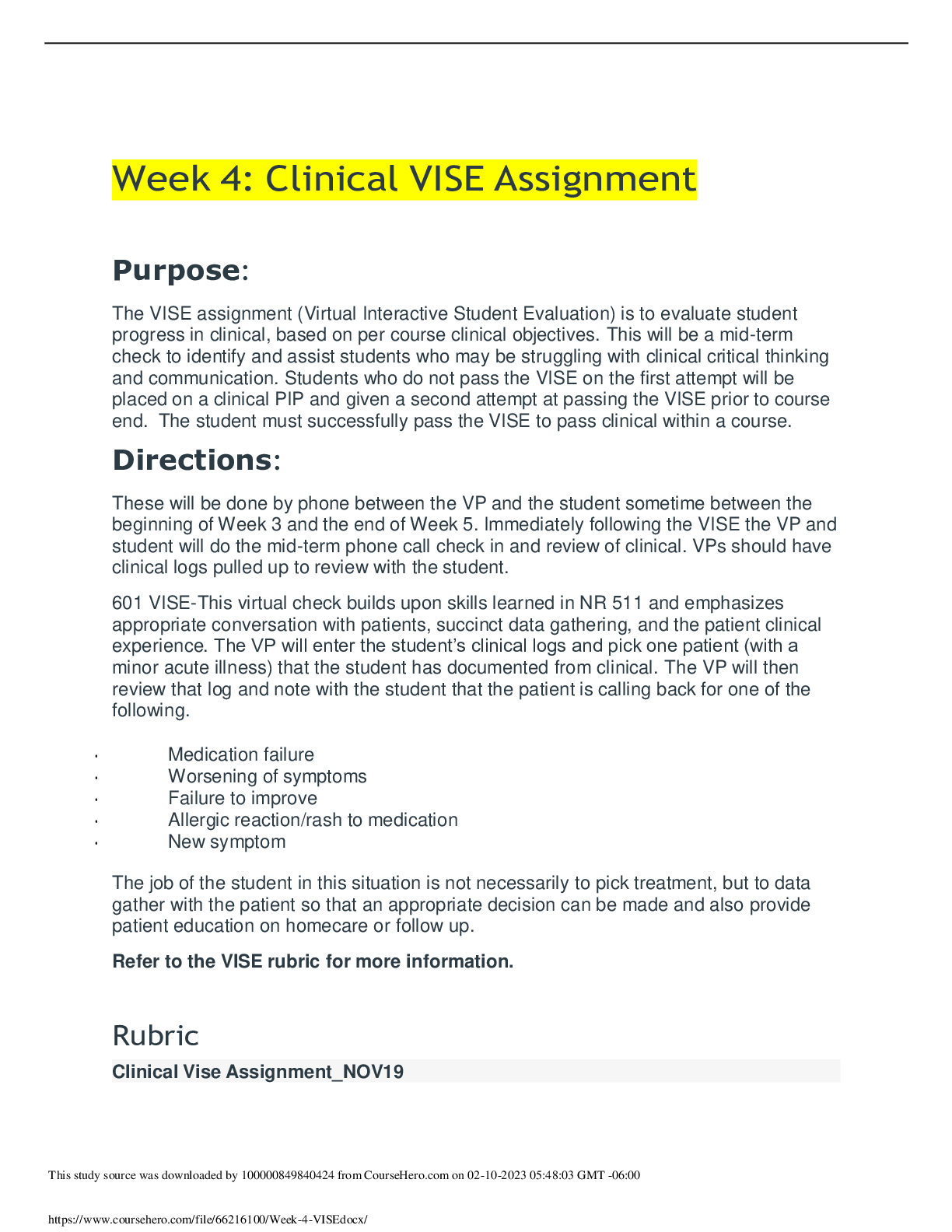
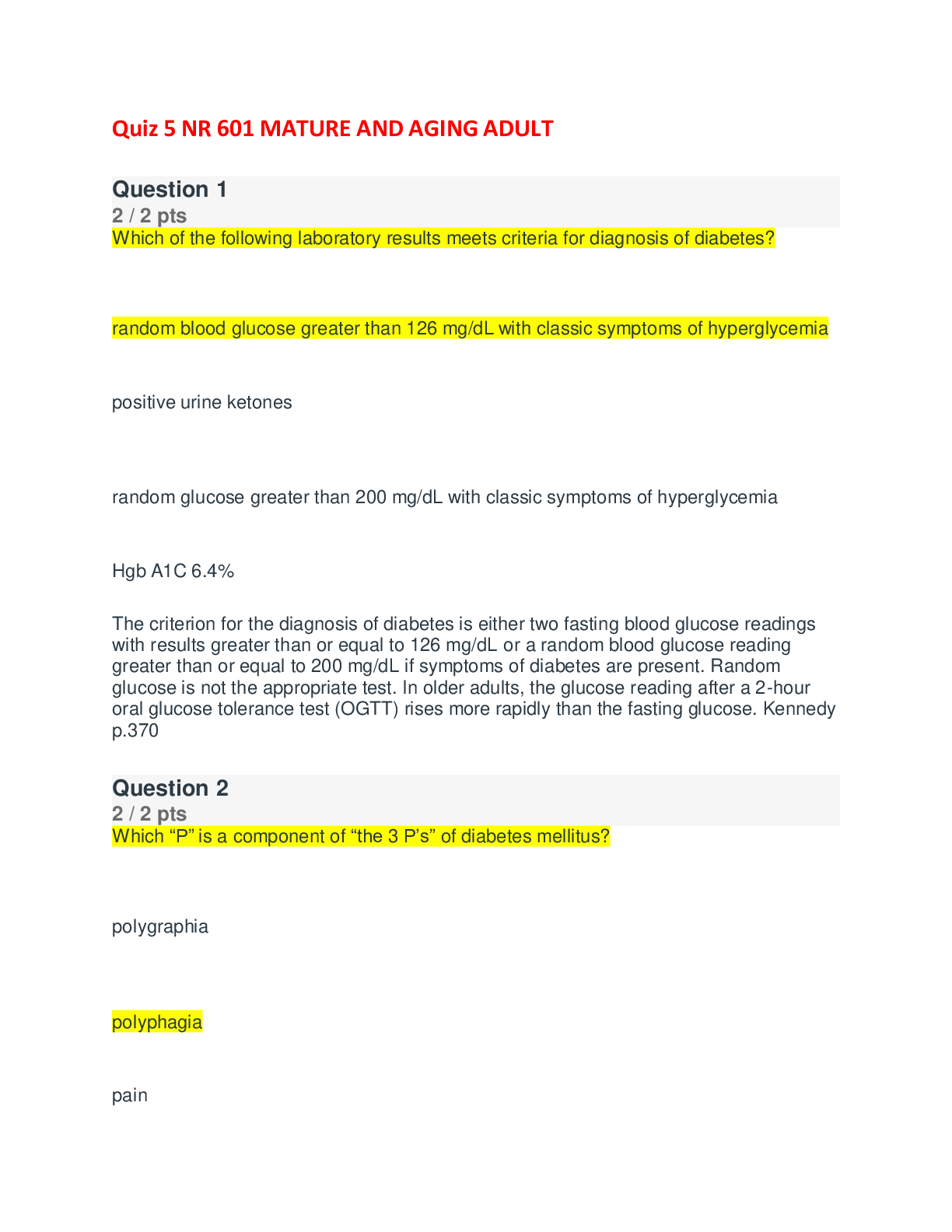
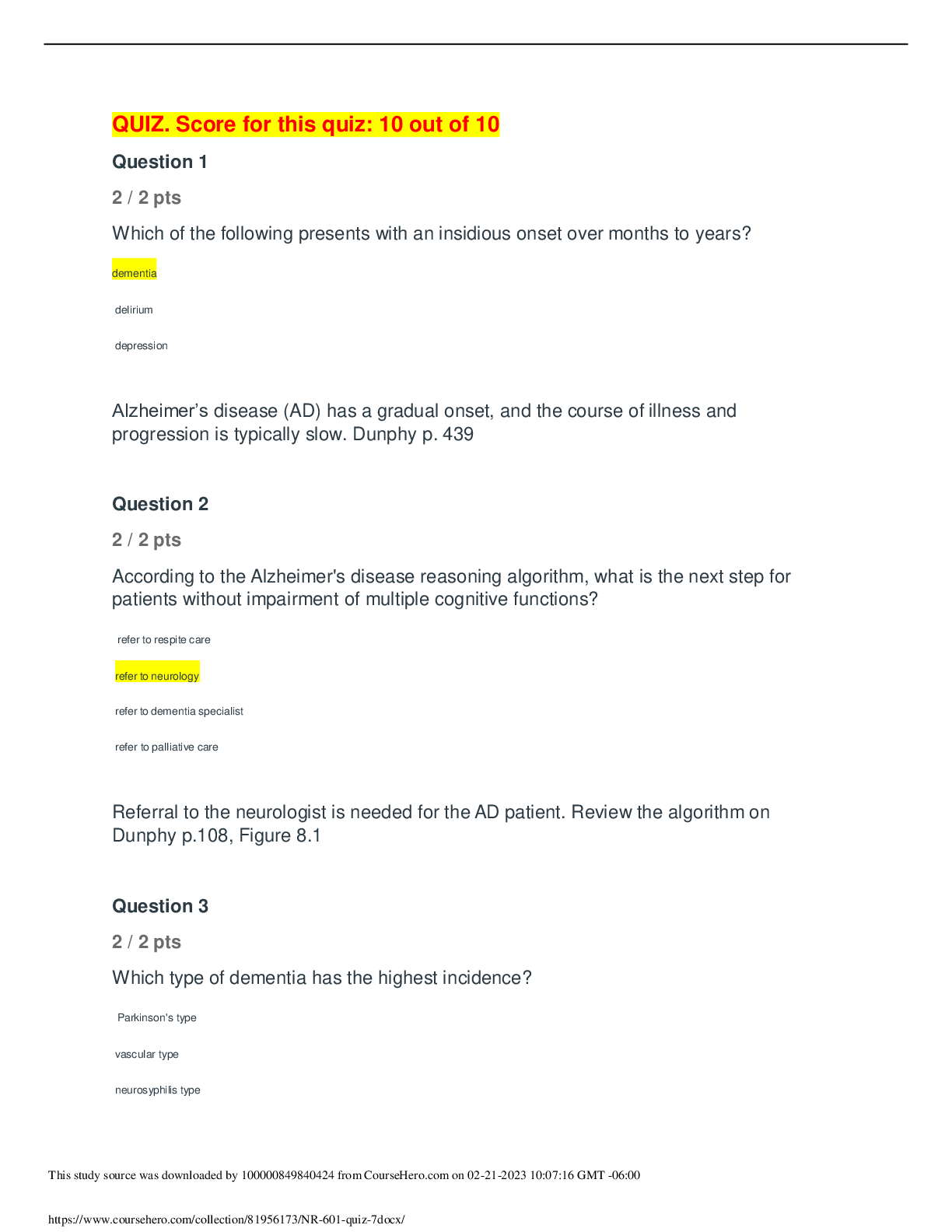
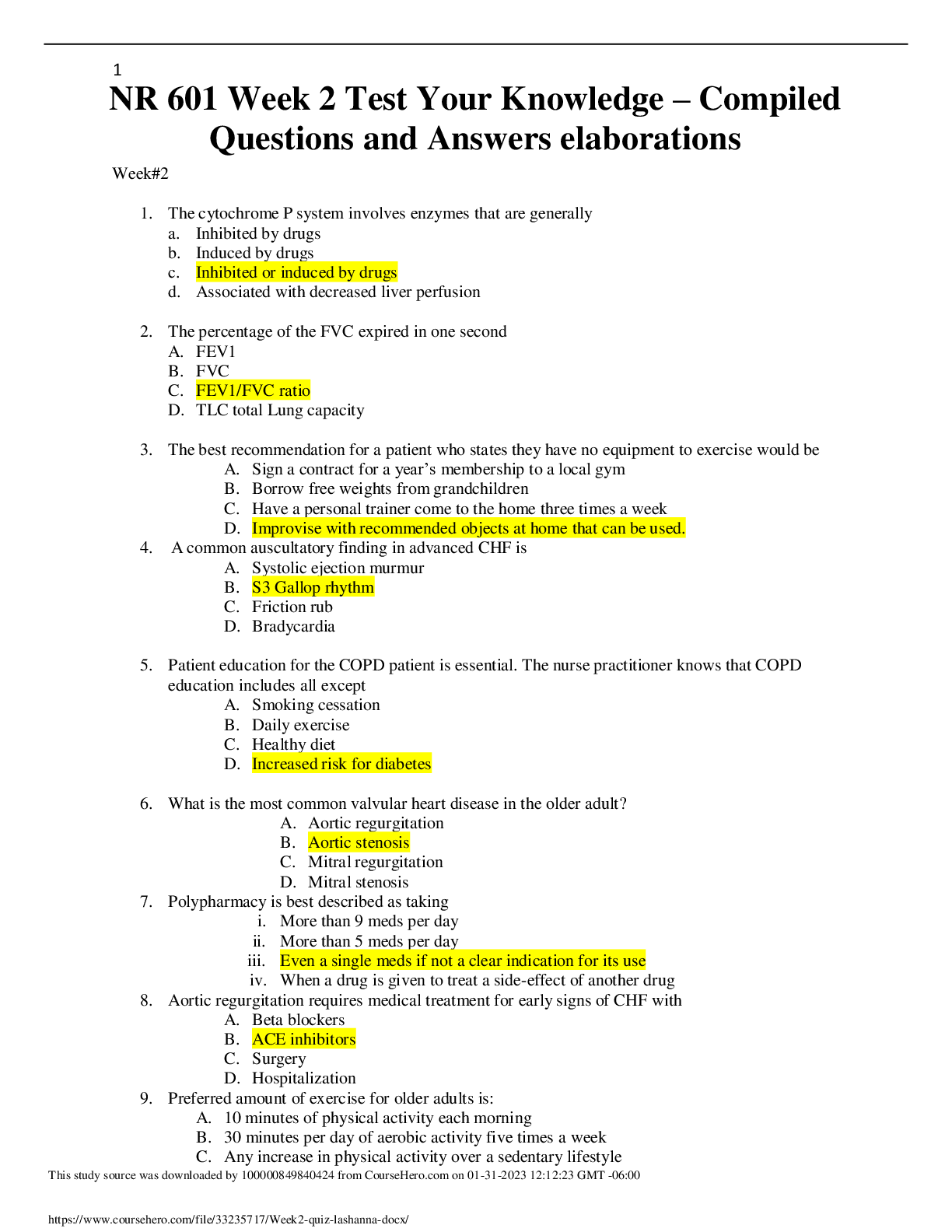
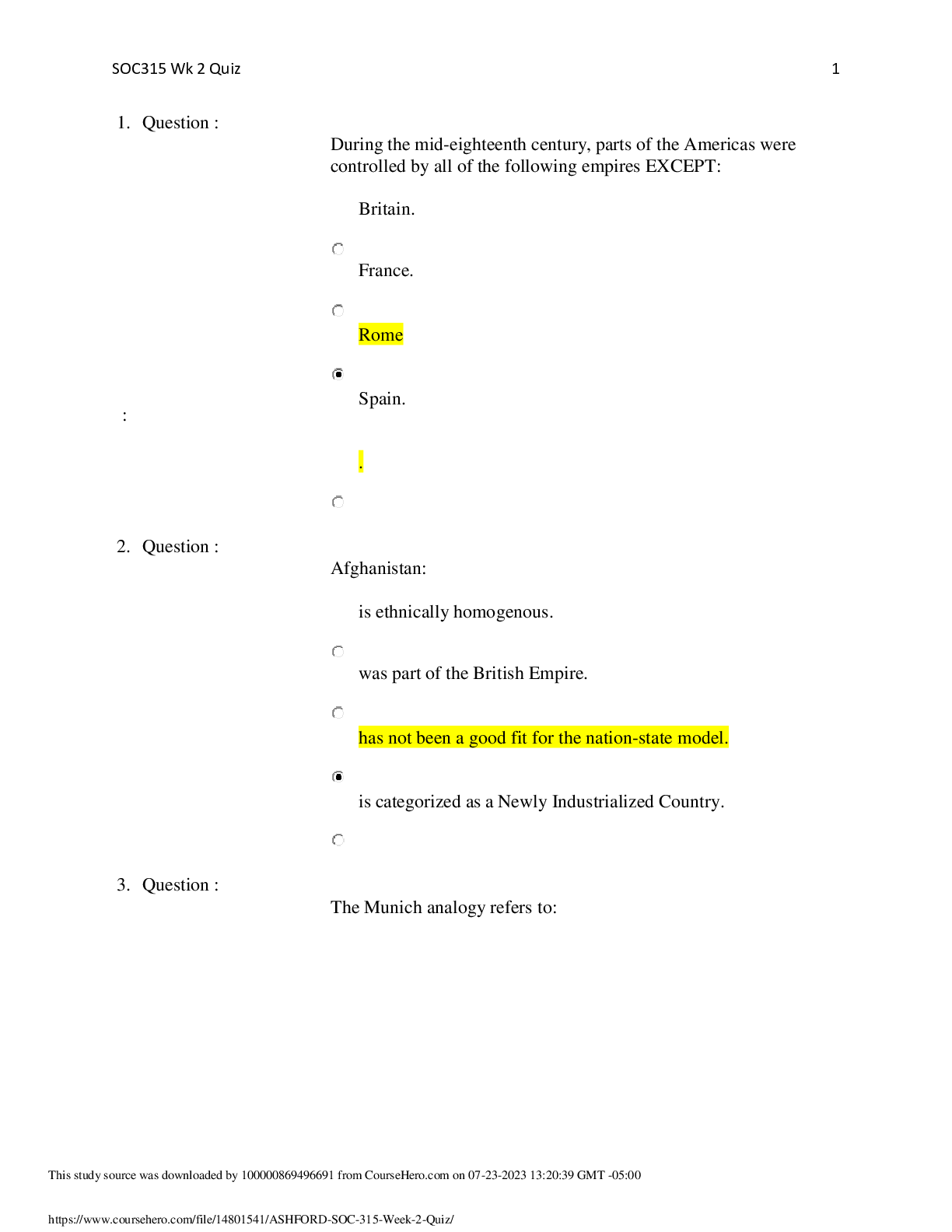
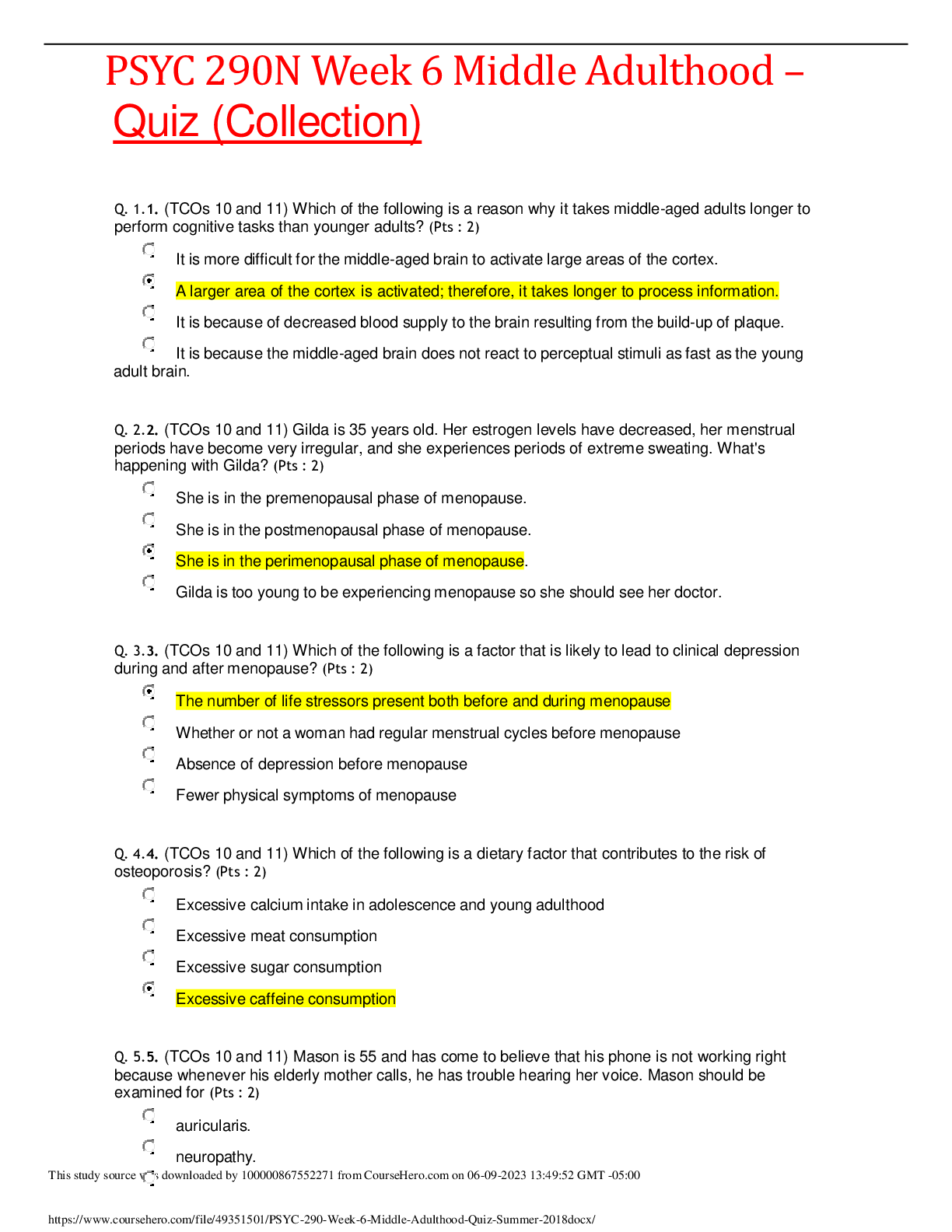
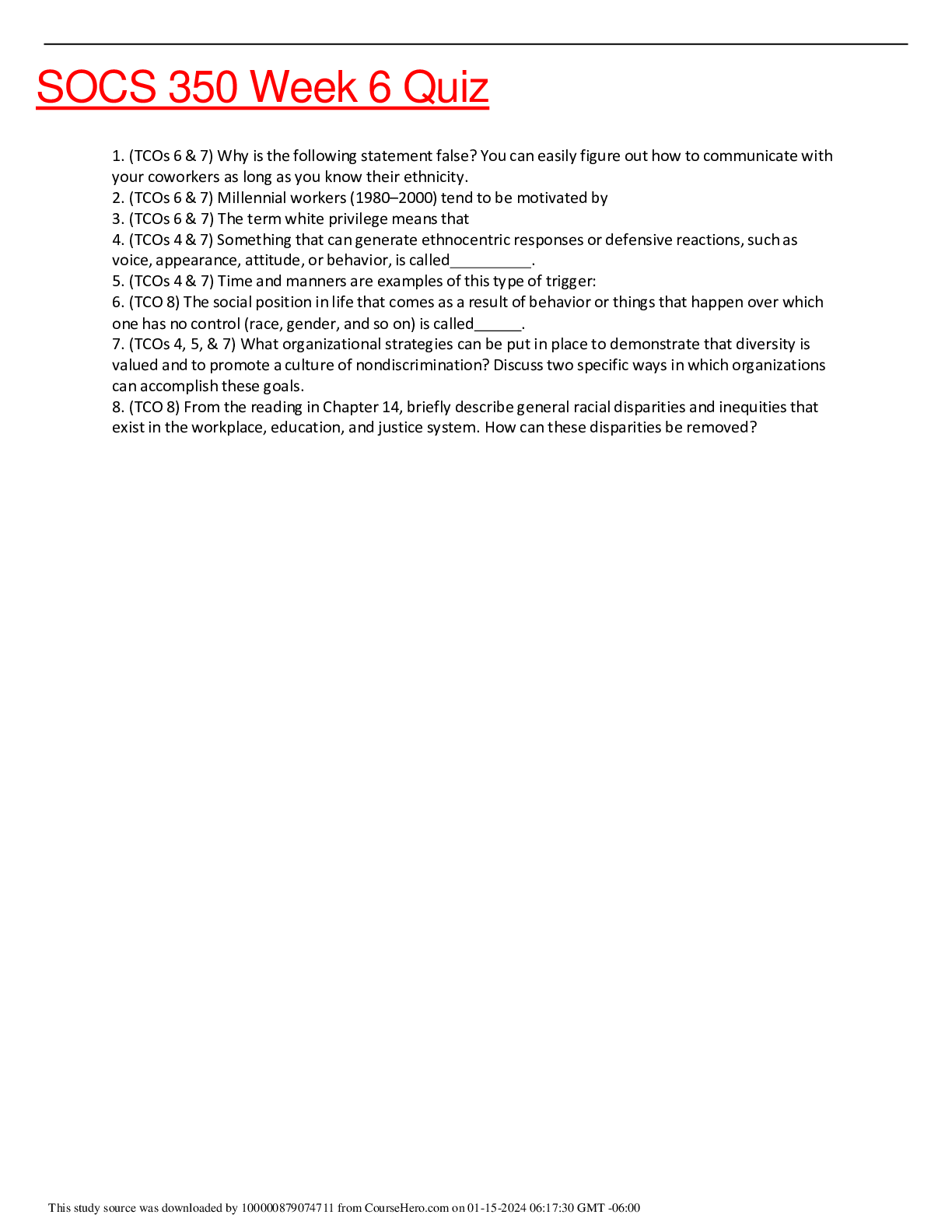

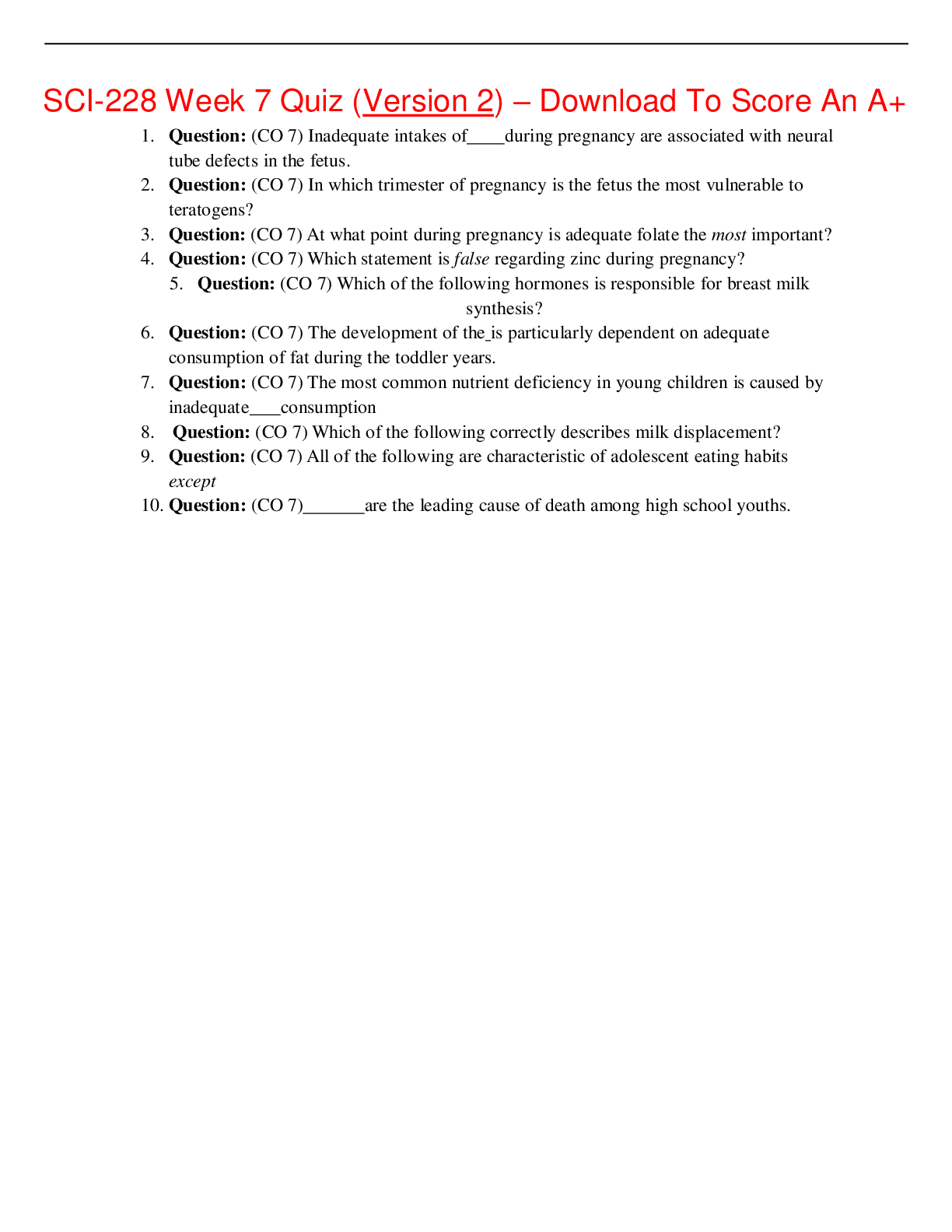
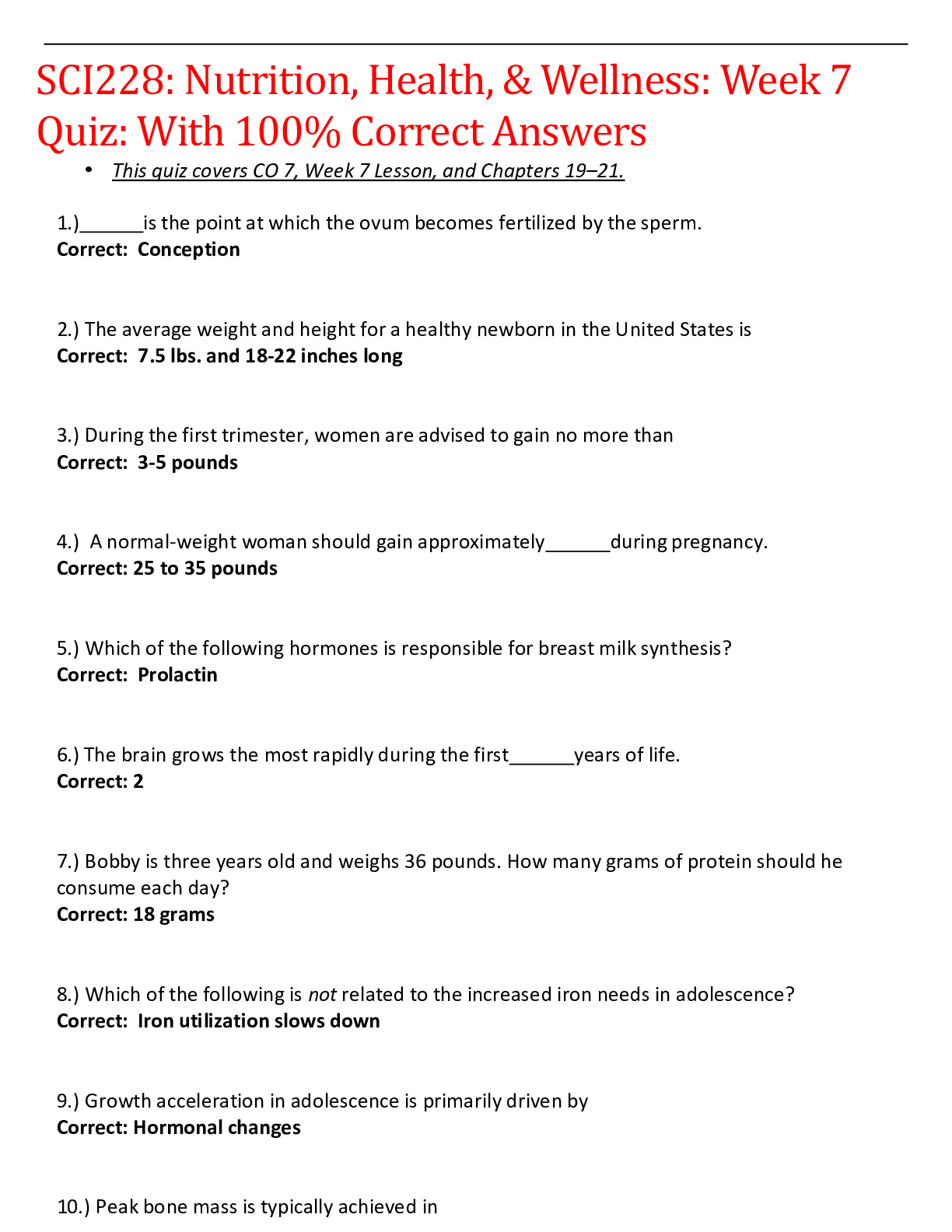
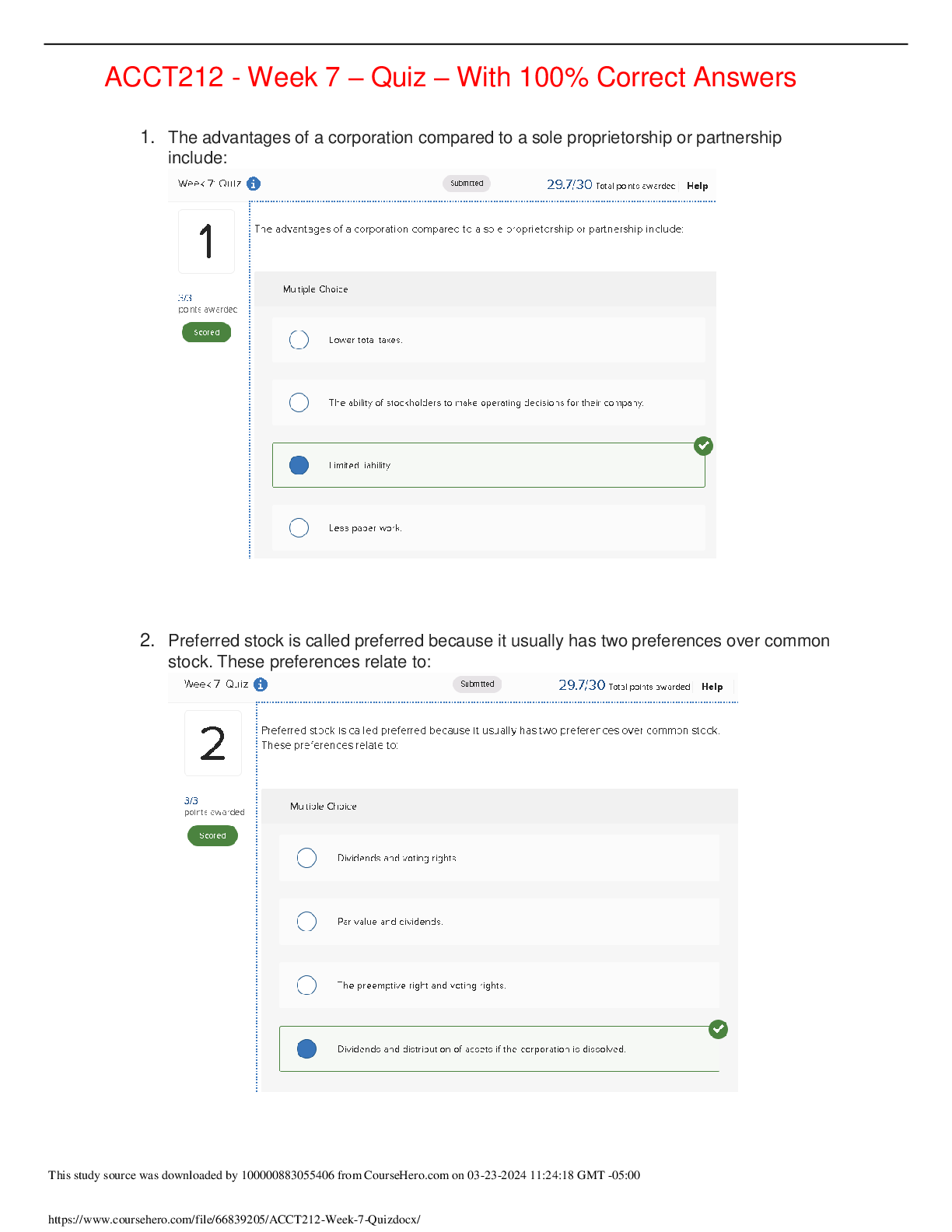

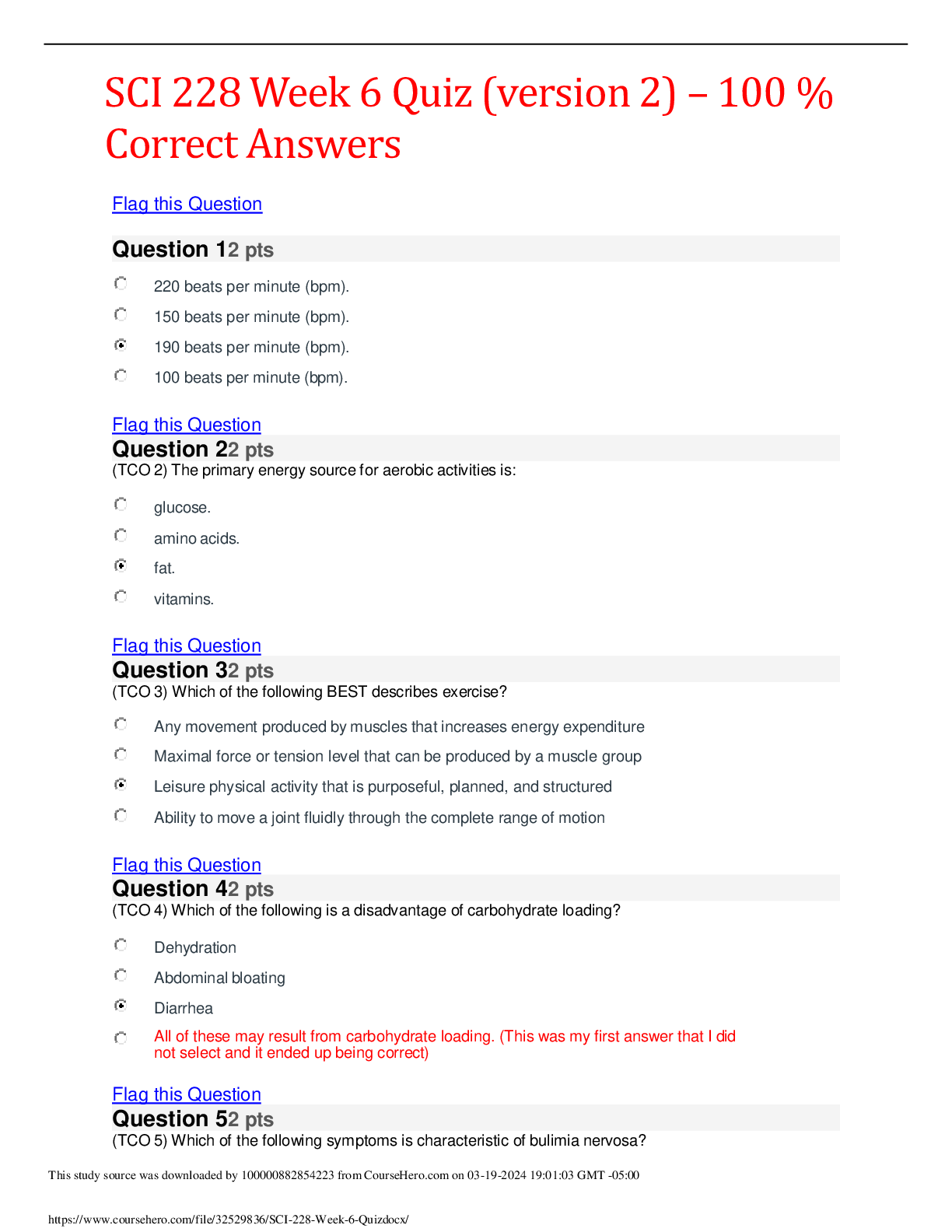

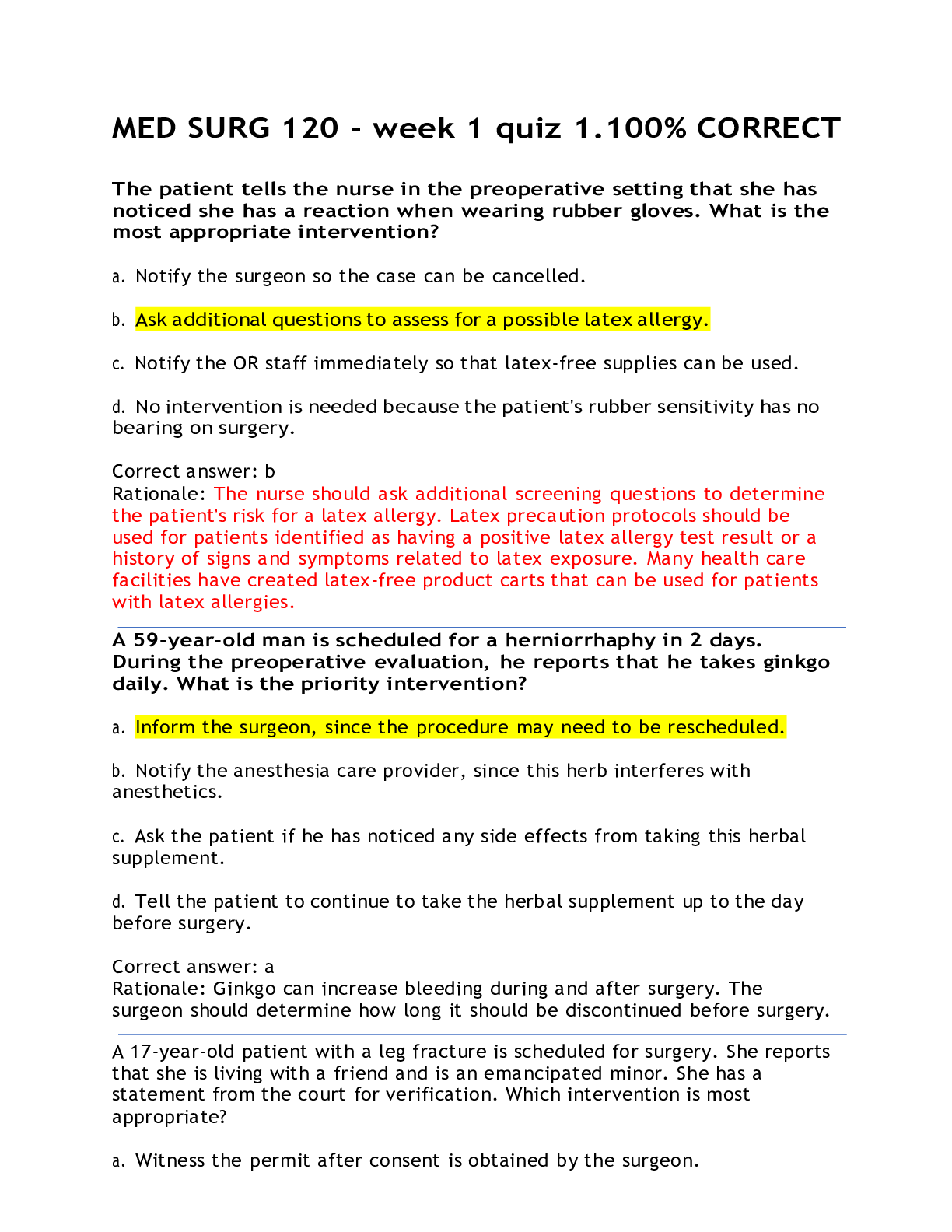


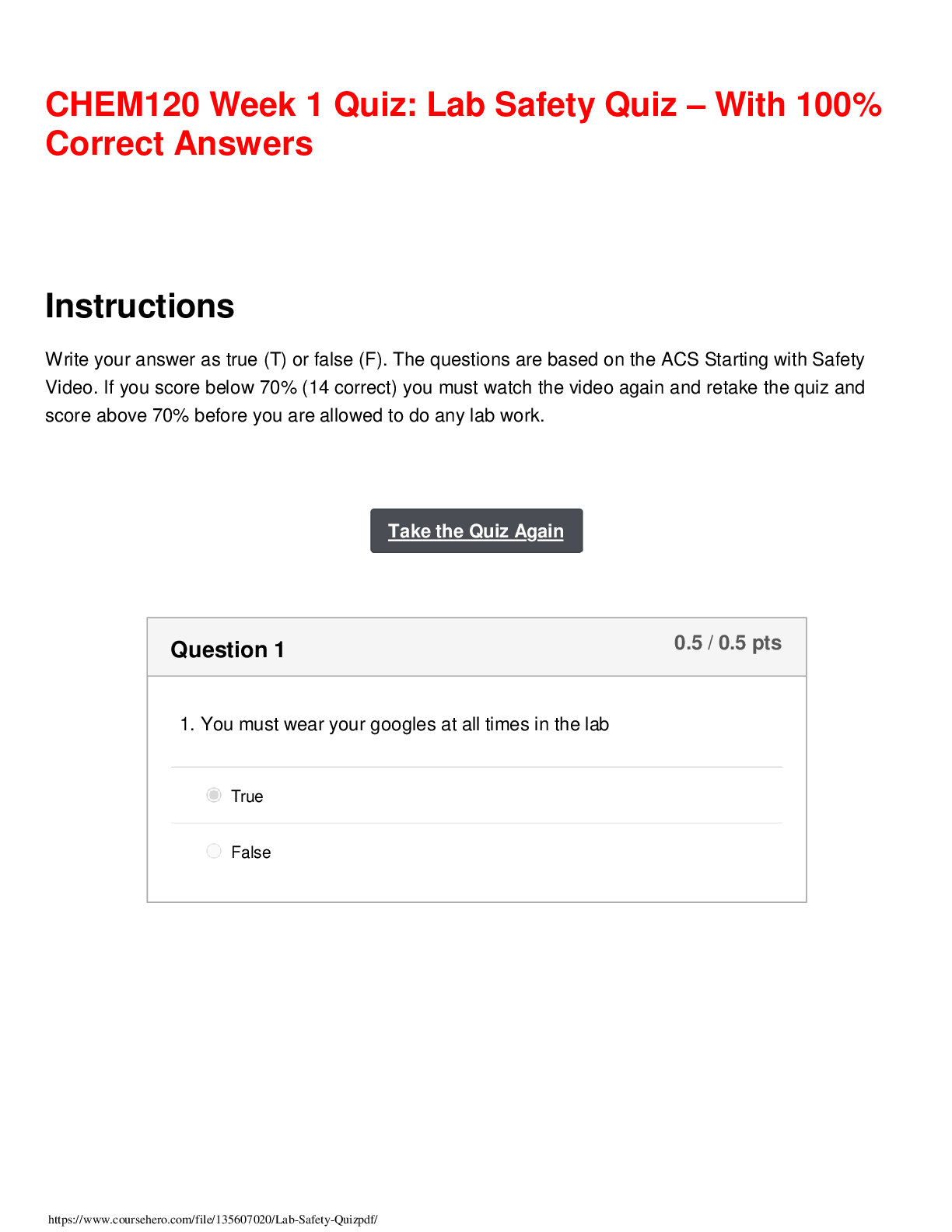
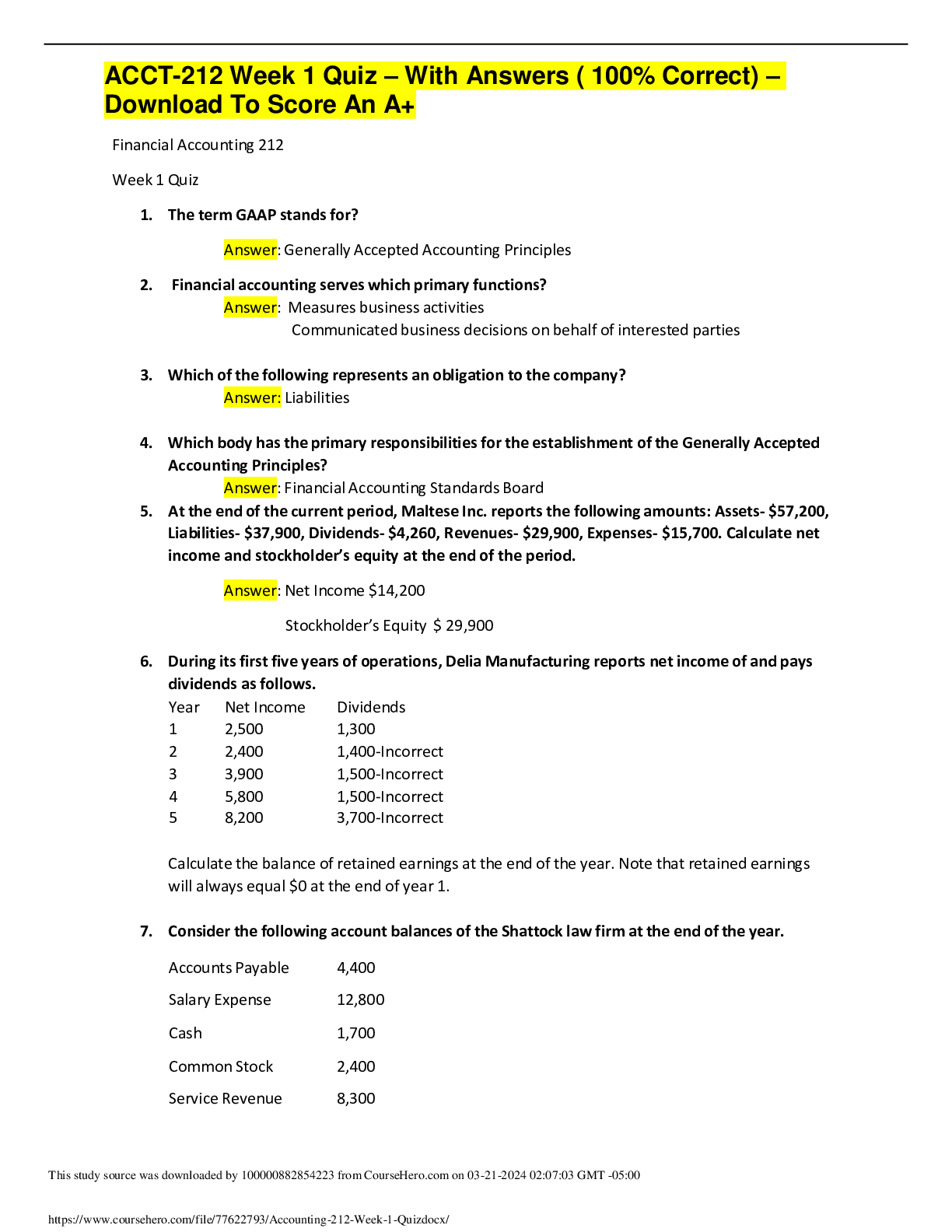

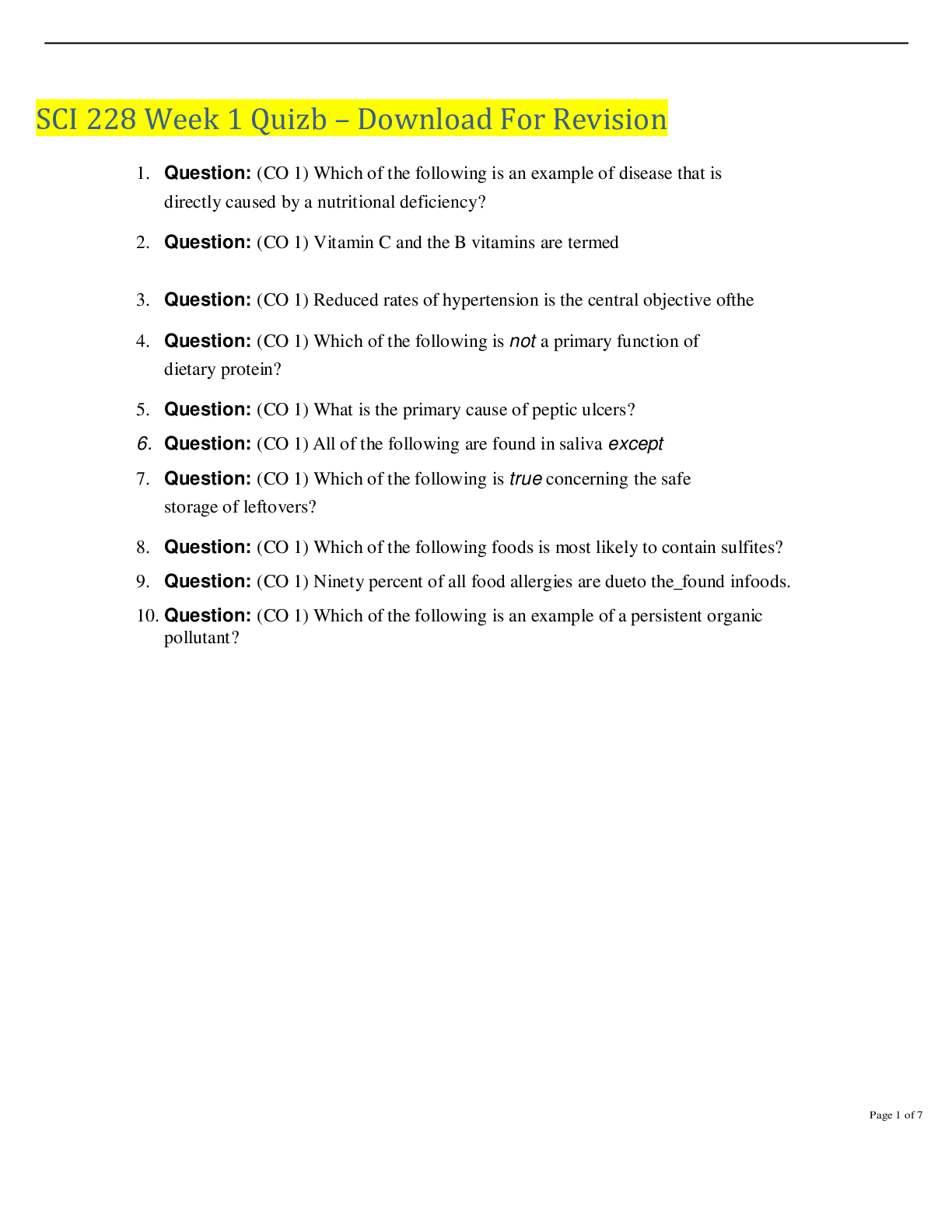
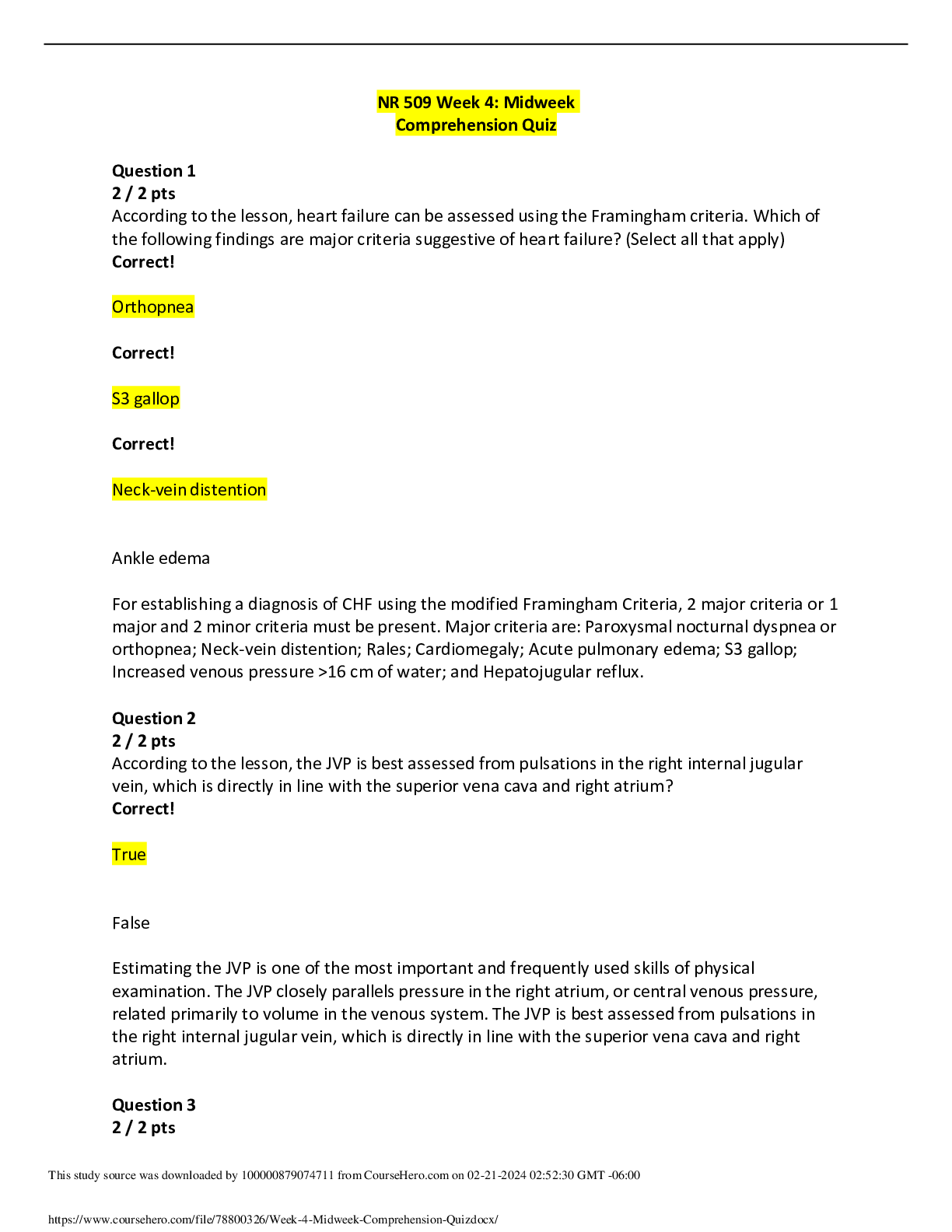
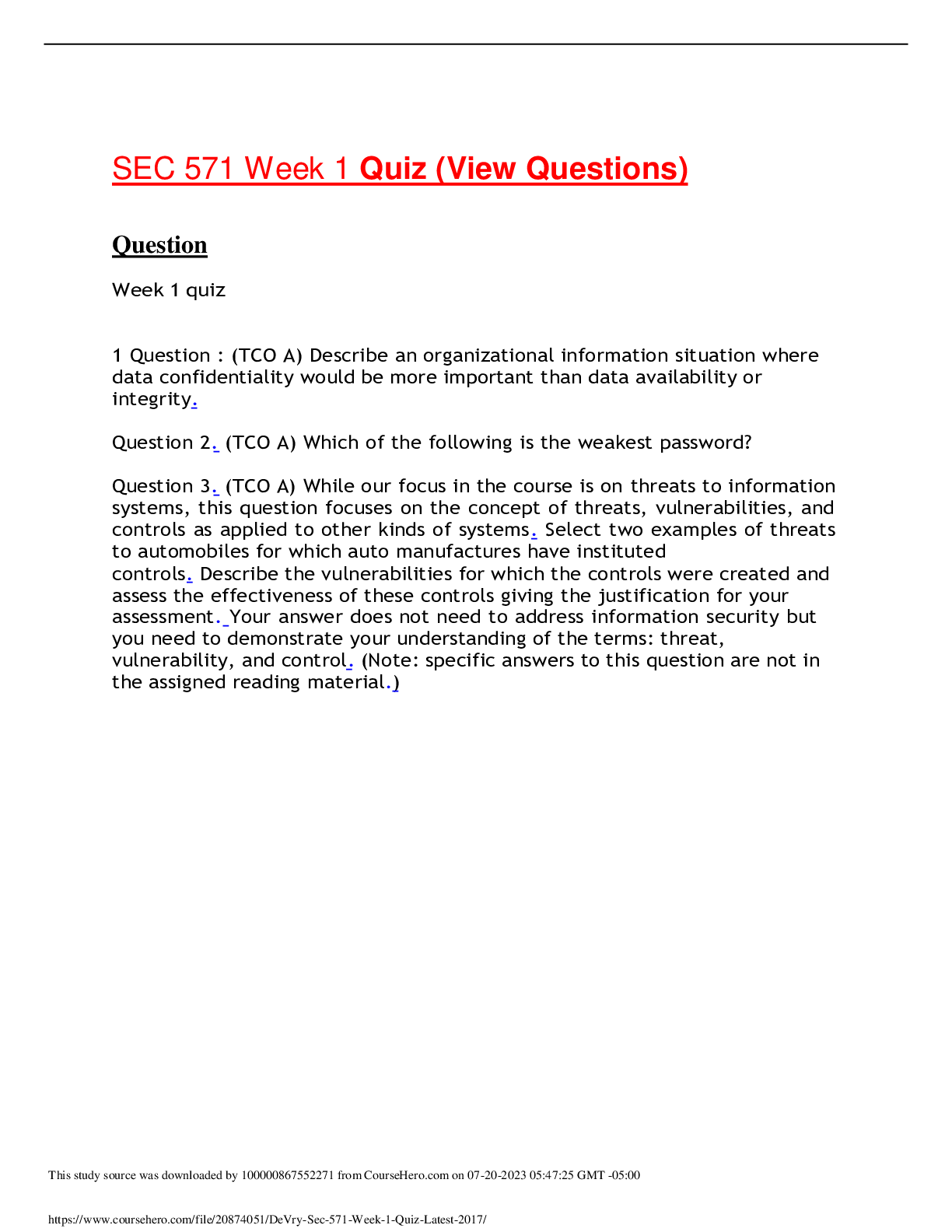
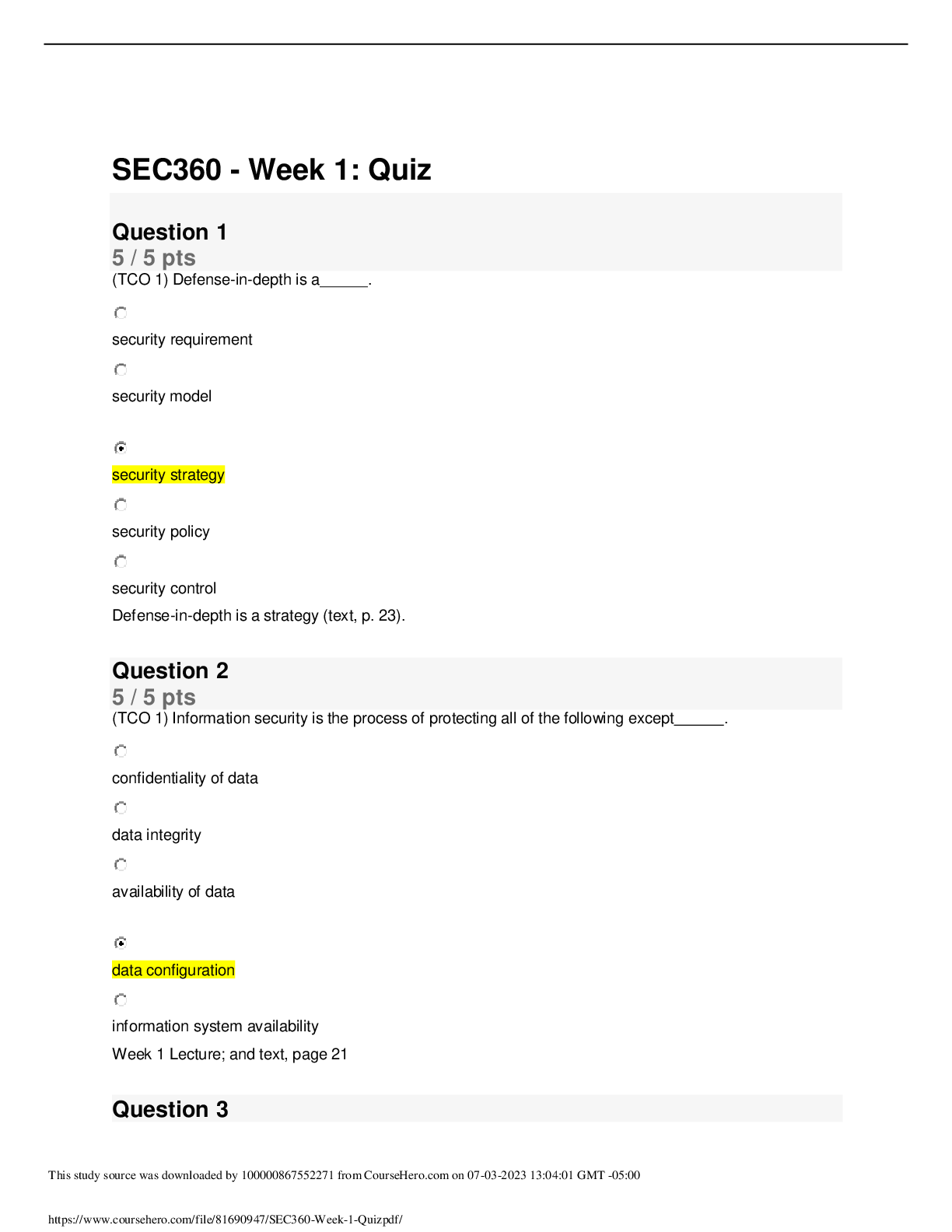
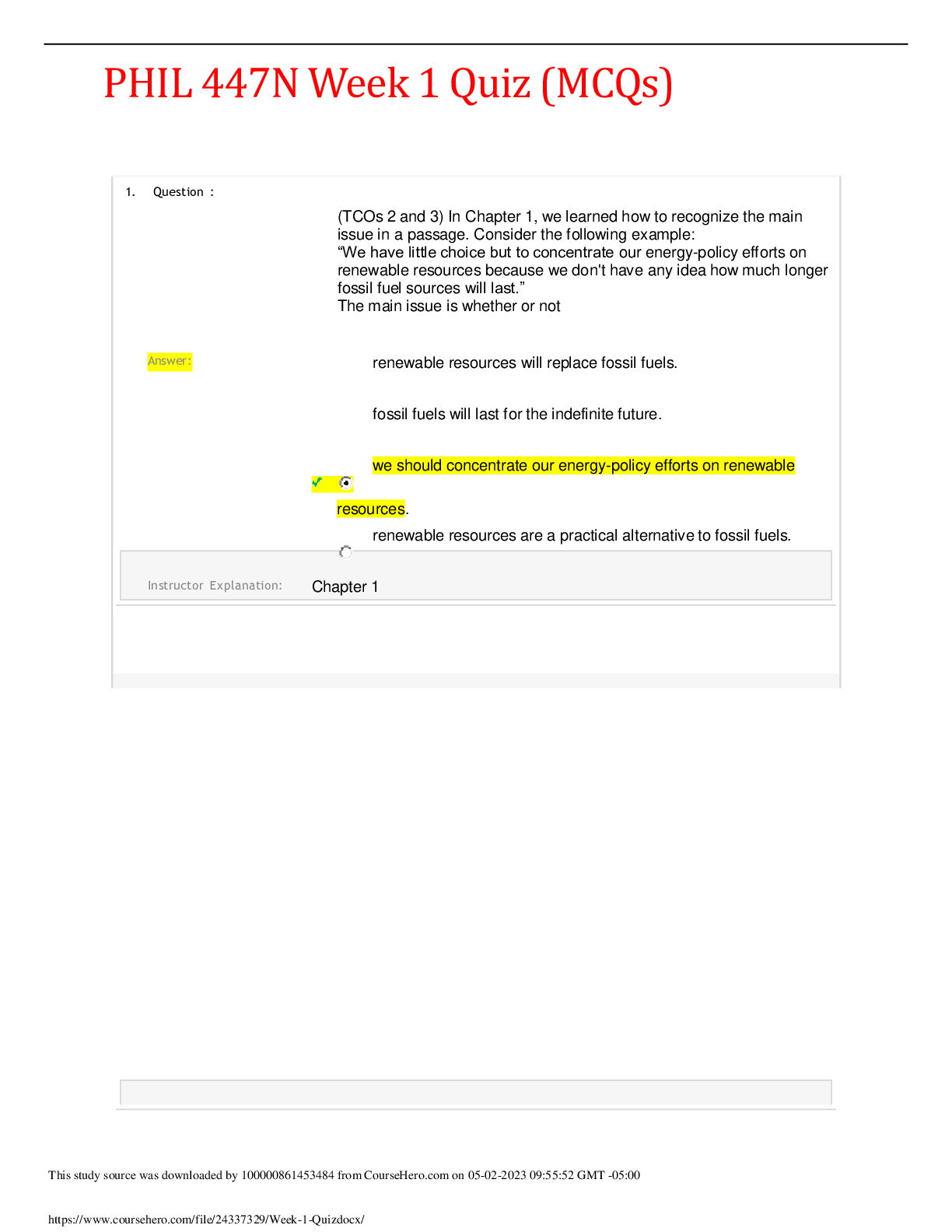
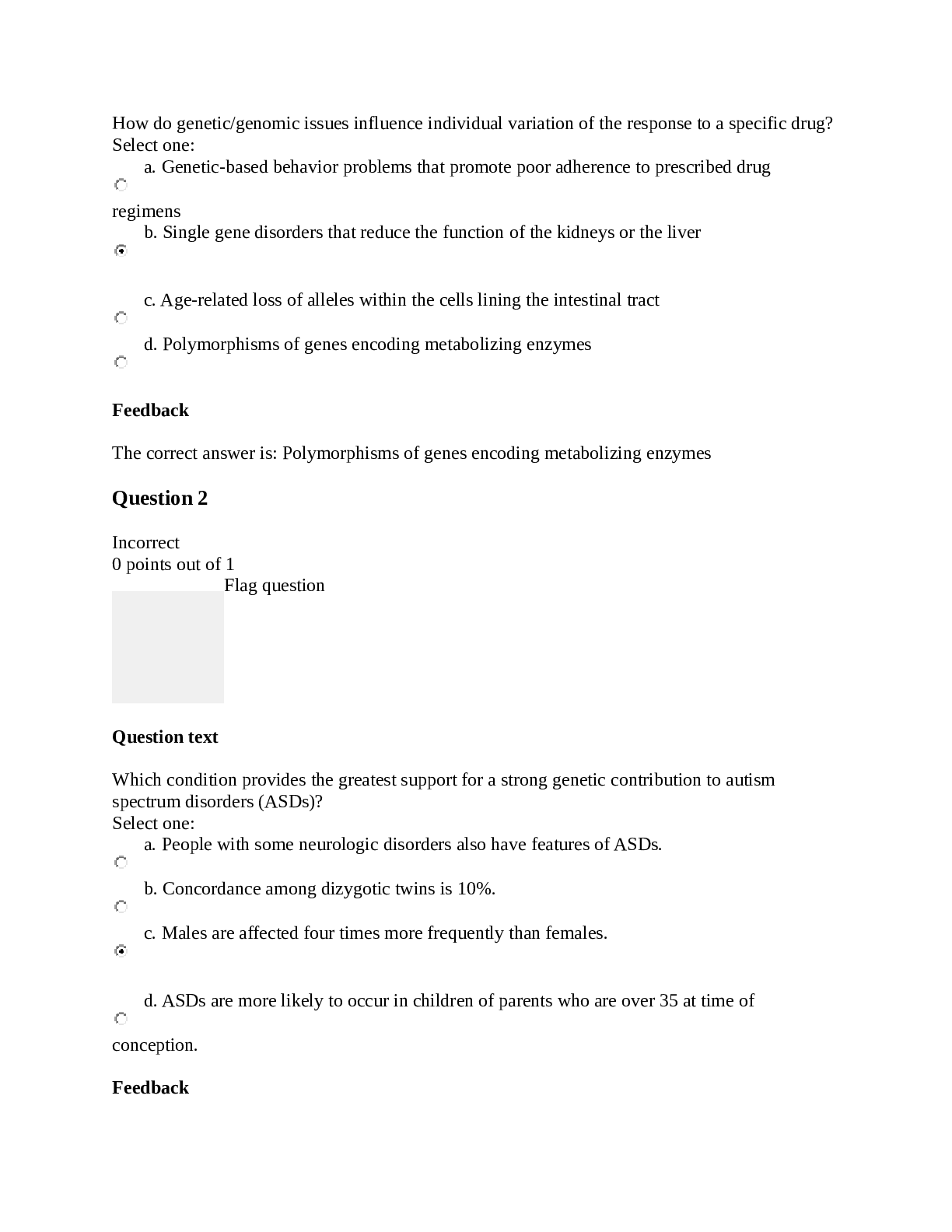
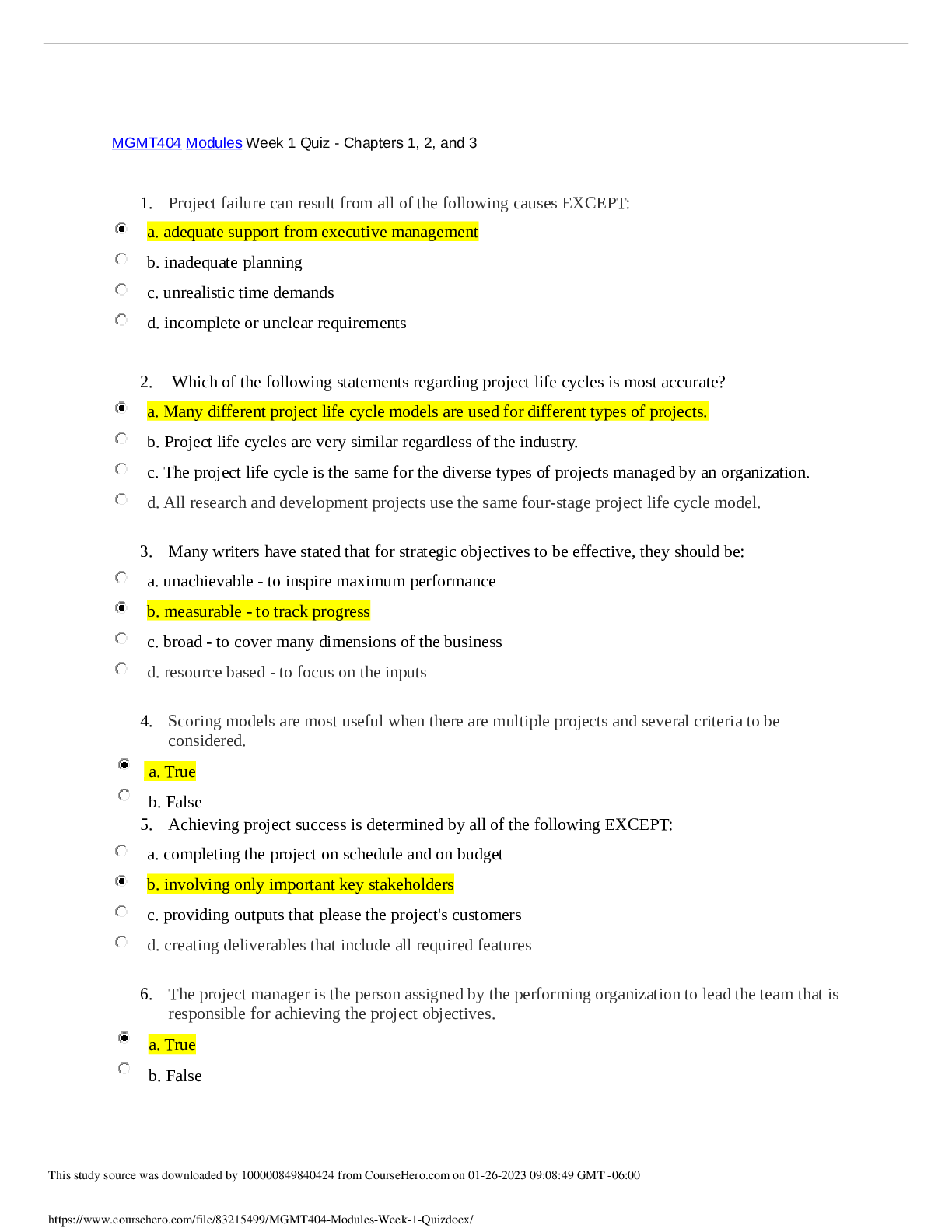


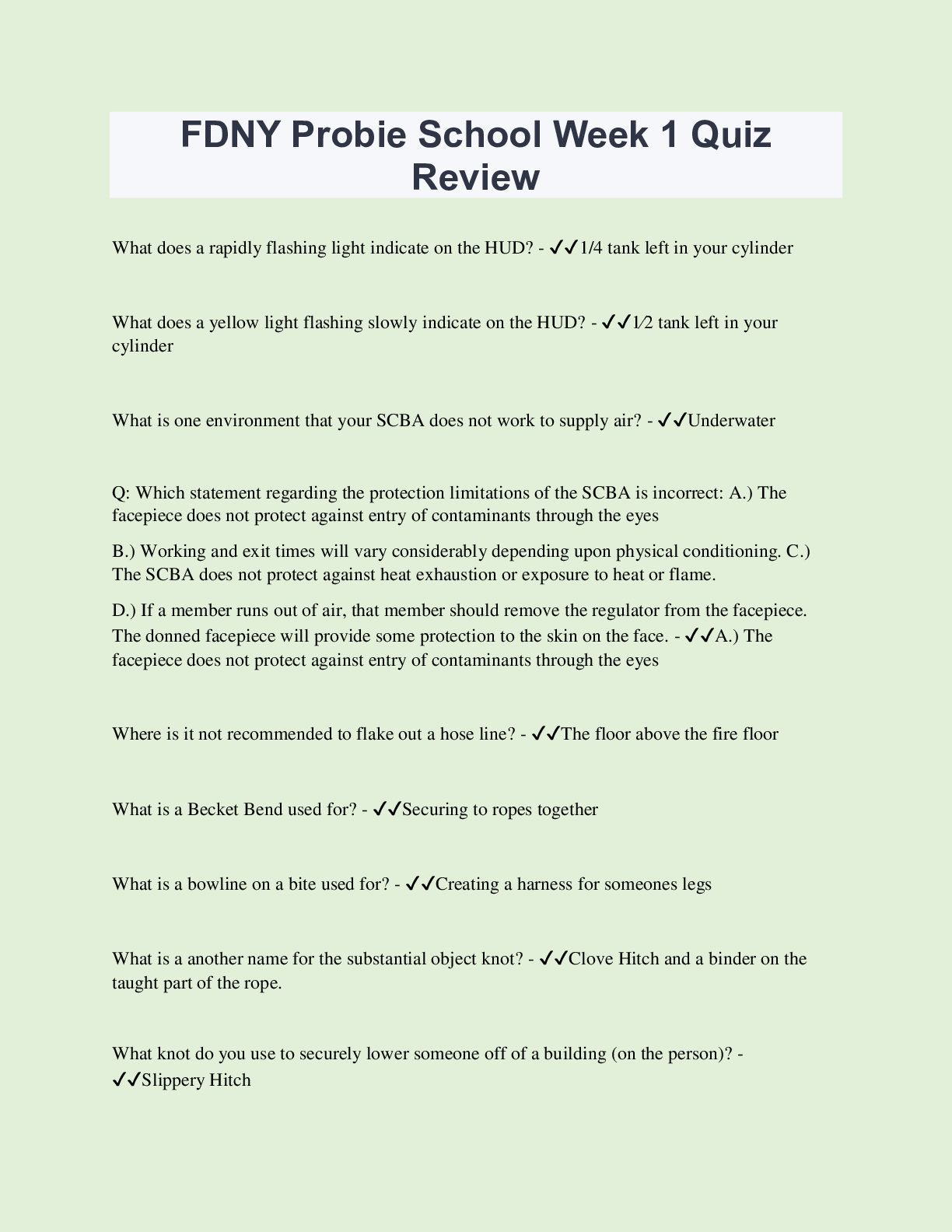
.png)
